exeposé



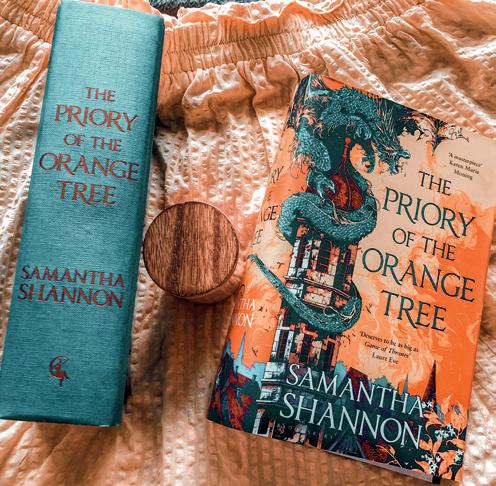

THE organisers of the Enchanted Garden Ball have come under significant criticism from students at the University of Exeter after extremely high demand led to there being three attempts for tickets for the event to be successfully sold, with one student describing the experience as “shambolic”.

The Enchanted Garden Ball (EGB) has occurred every year since 2010 and takes place at the Shobrooke Park Country House near Crediton. On the EGB website, it is advertised as a “hedonistic, spectacular playground of experimental micro-venues ranging from the vivacious to the outrageous.” This year’s EGB is due to take place on the 1st June.
The process of buying EGB tickets saw significant turmoil as it was only during the third attempted ticket release that students were able to successfully buy tickets. The first two attempts were on the ticket selling platform FIXR, which is widely used by University societies, on both the 12th and 19th February. Both attempted drops saw a surge in demand which crashed FIXR. On the 16th February, FIXR published a statement which was reposted on EGB’s Instagram page saying, “last Monday our platform temporarily went down and you
weren’t able to get tickets for EGB 2024. We’re sorry for the inconvenience, but rest assured you’ll be able to get your hands on tickets for the event of the year this coming Monday. See you there.” The following Monday, the second ticket drop saw a near identical crash. Exeposé has reached out to FIXR for comment but has not received a response at the time of publication.
EGB announced on the 22nd February that they were partnering with Skiddle as a new ticket provider. In the same post, EGB stated that “all ticket allocations remain the same” and that “society pre-sale will get access 15 minutes before general release, starting at 15:45” on the 27th February. They also noted that Skiddle was “noted for its reliability” with “4.3 million happy customers since 2001.”
The third attempted ticket launch was successful, with all 7000 tickets and return bus tickets selling out within minutes. However, many students felt that the system of society pre-sale tickets coming online only 15 minutes before the general sale left those without access to a code at risk of missing out on a ticket altogether. The introduction of a queueing system as part of the Skiddle platform meant that those without a society code were multiple thousands of places in the queue at the start of the general sale. One student reported that they were placed around 14,000th
in the queue once they joined.
In a survey of students who attempted to buy EGB tickets, many noted that having a society code made little difference to their chances of obtaining a ticket. One student asked “what’s the point in having society access to not even get tickets? How many society members failed to get tickets in place of those who didn’t pay society fees.” Another said that “society tickets did not work” and that they “had to wait in the queue with general ticket buyers.” Others believed that they were assigned random positions in the queue regardless of when they entered it. One said that they had been waiting 40 minutes in advance of the ticket release and were placed 12,000th in the queue while friends who joined at 16:00 were placed ahead in place 1000. Some students also reported having to join the queue multiple times, with one saying that they successfully bought an admissions ticket but had to rejoin to buy a coach ticket, which had sold out by the time they reached the front of the queue for the second time. Of the around 100 respondents, only around half reported they were able to procure a ticket and almost all noted that they had attempted to buy tickets on all three release dates.
When Exeposé reached out to EGB for comment, they said of the effect of queuing on society codes
that, “all participating sports teams and societies were allocated a specific amount of tickets. These codes ran until each of the societies had sold out. The purpose of society codes is to provide early access to tickets for society members, recognising their contributions and engagement. We acknowledge the feedback that the utility of these codes may not have met expectations this year. Notably, 99 per cent of society tickets were sold out before general release, and we even extended the on-sale period slightly to accommodate final transactions.
Recognising the need for improvement, we plan to adjust the timing of society ticket sales to begin up to an hour before the general release in future events, ensuring a more significant advantage for society members.”
Students also felt that the use of a queuing system was poorly communicated before the third ticket drop as some were only made aware of it “10 minutes before” and some were not aware until they joined the queue itself. EGB said of Skiddle’s queueing system that, “whilst the queueing system was advertised in the lead up to the event, we understand the frustrations some customers may have when utilising a platform that is unfamiliar.”
Continued on page 4
Editors
Print: Anabel Costa-Ferreira & Livvy Mason-Myhill
Online: Jamie Speka & Amelie Thompson
Print Deputies: Harry Craig, Charlie Gershinson & Joshua Smith
Online Deputies: Ewan Edwards & Megan Haynes editors@exepose.com
Executives
Finance: Willow Cracknell
Social Media: Charlotte Randall
Events: James Allen & Kritika Balhotra
Welfare: Destiny Walsh
News Editors
Print: Oliver Lamb
Online: Shagnick Bhattacharya & Anna Kane news@exepose.com
Features Editors
Print: Henry Parker & Benedict Thompson
Online: Michelle Chung & Callum Martin features@exepose.com
International Editors
Print: Josie Sharp
Online: Agata Koralewska
Comment Editors
Print: Lisette Reed & Charlotte Zeyssolff
Online: Charlie Oldroyd & Amy Rushton comment@exepose.com
Satire Editor Print Rosie Peters-McDonald
Lifestyle Editors
Print: Lucy Rawlings & Amberly Wright
Online: Emily Roughton & Zoe Sperry lifestyle@exepose.com
Arts + Lit Editors
Print: Maddie Conlan & Lauren Walsh
Online: Gracie Moore & Violet Berney artsandlit@exepose.com
Music Editors
Print: Jake Avery & Scarlett Cracknell
Online: Maya Fernandes & George Warburton music@exepose.com
Screen Editors
Print: Emily Sara Rizzo & Kayleigh Swart
Online: Jess Cadogan & Katie Matthews screen@exepose.com
Tech Editor
Print: Ewan Gregory & Charlie McCormack
Science Editors
Print: Eloise Shewring & Hannah Woodley
Online: Orla Watson sciandtech@exepose.com
Sport Editors
Print: Eloise Grainger, Oliver Rickwood & Ben Scott
Online: Mikhail Shklover & Ceri Vaughan-Jones





@exepose
@exepose
facebook.com/exepose
issuu.com/exeposeexeter
SOMEHOW it is both already March and week eight! As the academic term is already drawing to a close, keep an eye out for our nomination process for the 2024/25 Exeposé committee and feel free to email us if you have any questions.
In News this week, we analyse the proportion of privately-educated students vs. state-educated (page 5). We also look at the response to the Exeter Girls Can campaign (page 7).
In Features , there's an analysis of Tucker Carlson's interview with Vladimir Putin and its implications (page 8), as well as an interview with Jerome Starkey on his experiences on the frontline ( page 9).
International discusses a trip to Slovenia as well as Greece legalising same-sex marriages ( page 10)
In Comment , there's a Call to return the Easter Island statue (page 12), as well as an exploration into Sephora tweens ( page 13).
Meanwhile, Satire takes us through a day at the races ( page 14).
In Exhibit , Lifestyle importantly celebrates International Women's Day (page 16). There is also a discussion on the rise of imperfect podcasts (page 17). Arts and Lit discuss theatre prices going up (page 18) and their favourite fantastical reads (page 19).
ASELECTION procedure using a lottery system is starting to be implemented by several Dutch universities in hopes of creating equal opportunities for medical studies applicants.
Trouw magazine reports that Nijmegen’s Radboud University is considering an unweighted lottery, while sites in Rotterdam and Gro ningen intend to imple ment it only partially, maintaining some se lective procedures.
Music takes a look at Beyoncé in her cowgirl era ( page 20 ). Screen discuss streaming services — for and against (page 23). Tech looks at the console wars and whether they are over ( page 25) and Exetera Exetera provides a recipe for pasta alla vodka ( page 26).
Science discusses the effects of excessive alcohol consumption (page 28) and Sport recounts the Super Bowl LVIII (page 31) and the recent Chill Hill event on campus ( page 32 ).
After a week of intense deadline we are back in the Exeposé office and so excited to share with you our penultimate issue of term!
As always, a huge thank you to all our contributors and proofers. We hope you enjoy this edition and have a lovely week!





DThe
The standing system requires medical students to undergo knowledge tests as well as providing CVs and motivation letters, which leads to the privileging of students who had access to more resources prior to higher edu cation. The efforts to create a level playing field and a more diverse profession are acclaimed by the Education Inspectorate, as these unbiased selections are likely to become a trend for the future of medical studies in the Netherlands.
EEMED potentially “very dangerous” by security experts, academics in Britain, America and Australia have been collaborating on drone technology research with a sanctioned Iranian university. The university was sanctioned under international financial policy due to its close ties with the Iranian military. Drones made and developed in Iran have been used for a variety of fatal attacks in both the Ukrainian and Middle Eastern conflicts (according to The Guardian ), with their development being viewed as extremely important by the Iranian government.
While there is so far no evidence that the research collaborations break any laws or violate any sanctions, the ethics of conducting these collaborations remains up for debate.
IN an employment tribunal decision, Bristol University professor David Miller’s sacking by the University for his anti-Zionist beliefs has been ruled an unfair dismissal under section 10 of the Equality Act 2010.
Since calling Zionism (a political ideology that calls for the creation of a Jewish state, today underpinning the state of Israel) a “racist and genocidal ideol ogy” and a source of Is lamophobia in the UK in a 2019 lecture, Miller’s beliefs have caused substantial controversy across academia.
According to Miller, Bristol University put him through “discrimina tory and unfair miscon duct proceedings which cul minated eventually in his dismissal” in October 2021 after he participated in a 'Building a Campaign for Free Speech' event.
Young
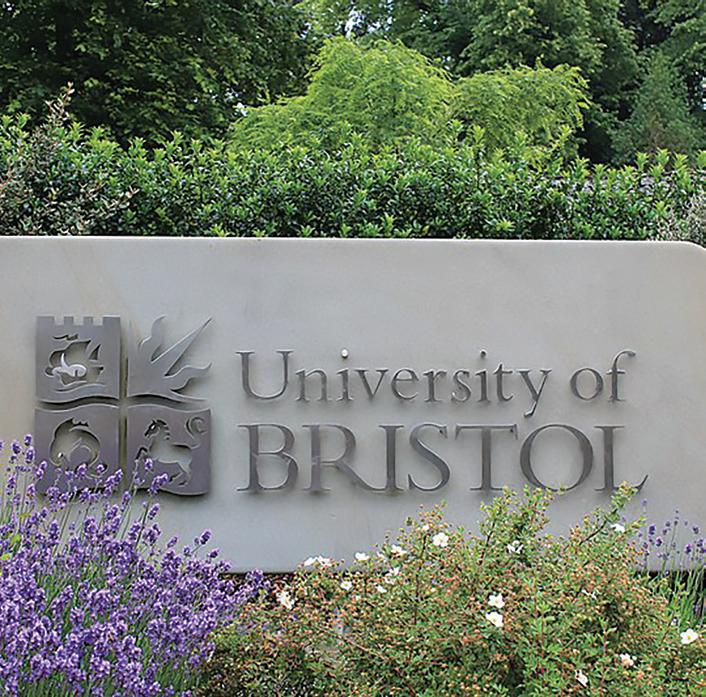
SThe employment tribunal stated Miller’s academic freedom and freedom of speech had been breached, ruling that philosophical beliefs such as these in the workplace are protected characteristics under the 2010 Act for the first time.
TUDENTS in India are frustrated about the state of education and their government, a youth referendum has found. The Young India Referendum, conducted by the All India Students Association (AISA) earlier this month, polled over 100,000 students in over 60 different universities across the country. The referendum showed that around 90 per cent of students believed the government failed to deliver on employment, with mass objections to fee hikes and other policies which have been dubbed “antistudent” by the AISA. The findings spell trouble for the Narendra Modi government under the BJP, who are facing an election by May this year with tough opposition from the well-established Indian National Congress. Despite BJP winning the previous election in 2019 in the biggest landslide in nearly four decades, this election has become competitive, with mass opposition from young people in a country where half of the population is under 35.
By Emily Sara Rizzo,ALMOST 100 new homes are to be built on an Exeter greenfield site, subject to an investigation into flooding risks. To be built by Edenstone Homes on land off Spruce Close and Celia Crescent, the development will include 93 detached, semidetached, and terraced houses, of which 32 will be affordable homes. A new valley park will also be designated and will cover 9.13 hectares in the fields to the west and to the north of the development.
When the development was first proposed in 2021, the council received over 500 letters of complaint, and it was unanimously rejected. However, a planning inspector overturned the decision, saying that Exeter’s housing crisis outweighed other issues.
Several concerns have been raised around the development, mostly to do with lack of infrastructure, such as schools and GPs, loss of biodiversity and increased traffic. Most of these were rejected by the committee, who argued that the new park would result in over 10 per cent
biodiversity net gains and that the developer would contribute to infrastructure such as schools.
The main issue surrounds flooding, which was brought forward by the Lead Local Flood Authority (LLFA). The LLFA has submitted an objection around draining, and the committee have agreed to allow the development on the condition that LLFA remove its objection pending its investigation. Whilst some issues remain unresolved, the committee concluded: “No adverse impacts are considered to outweigh the benefits.”

THE University of Exeter and the local area have suffered power cuts in recent weeks, which have been attributed to a fault with the National Grid.
Streatham Campus saw a blackout on the 21st February around midday, affecting the whole site. Soon after power was restored, Mike Shore-Nye — Senior Vice President and Registrar & Secretary, sent an
email to all students entitled “Power” in which it was confirmed that the power cut was caused by a National Grid area network fault. Power was restored through the University’s back-up generators.
A spokesperson for the University of Exeter said: “Due to a National Grid area network fault, the Streatham Campus experienced a power outage recently. Full power was restored as quickly as possible and the University worked with the National Grid to assess the risk of any further interruptions. The University has back-up generators should they be required.”
There have also been multiple outages in the city of Exeter. On the evening of Friday 16th February, DevonLive reported that power was cut to 385 properties in the Newton area with witnesses saying that power was cut to all of Magdalen Road (which was in “total darkness”) and to the High Street’s streetlights. Many students also reported having their power cut to their households.
The most recent power cut at the time of publication was on the 25th February, affecting 800 properties in the EX1 and
EX4 areas. The National Grid said that this was due to a fault
on the high voltage network in the area, causing the power cut.

RECENTLY announced across Overheard and Instagram, The Costume Box is a new Exeter initiative hoping to ‘rescue those oncein-a-blue-moon costumes from bedroom purgatory!’ Organised by students and for students, the service allows students to rent out costumes for a singular use at a student-friendly price. At a university where socials are constant, and the need for Wednesday costumes never ends, this scheme looks to solve a problem charitably.
In conversation with the founders of the initiative Jena and Tom, they shared how The Costume Box was made in response to an entrepreneurship module “Business Ignition — Idea to Implementation.” The project aims to “solve the twosided problem of fancy dress
culture at university by a) reducing the amount of clutter from singleuse costumes and b) sourcing second-hand costumes at last minute availability and low price.”
When asked how the rental scheme works for those interested, Jena and Tom told Exeposé that students can simply view options on their social media pages and send them a message in order to both reserve an item and make a payment. From then, they arrange a pickup location, and you can choose the time. Those who borrow items are also asked to wash them before returning and can then arrange to drop them off at the same location.
All the proceeds of this
initiative are donated to a local charity Adventure Therapy which is based in Ilfracombe, Devon. The Costume Box team
explained how the charity “were really interested to work with us as they provide support for children and adults with unique health conditions, giving them the opportunity to explore and discover the world.” They are hoping to expand the business over the coming months and work more closely with the charity. They also hope “of increasing the sustainability of costume consumption and production in Exeter.”

Speaking to the founders of The Costume Box, they detailed how current students can get involved in a number of ways. From renting costumes to donating items they appreciate any form of support. They urge students who have costumes they no longer have a use for “to send us a quick
photo of it with its size and condition” and they can then find a new home for it. Ultimately, the greater the student involvement, the greater the range of costumes available to rent. For those of you interested you can find them on Instagram: @costumeboxexeter.
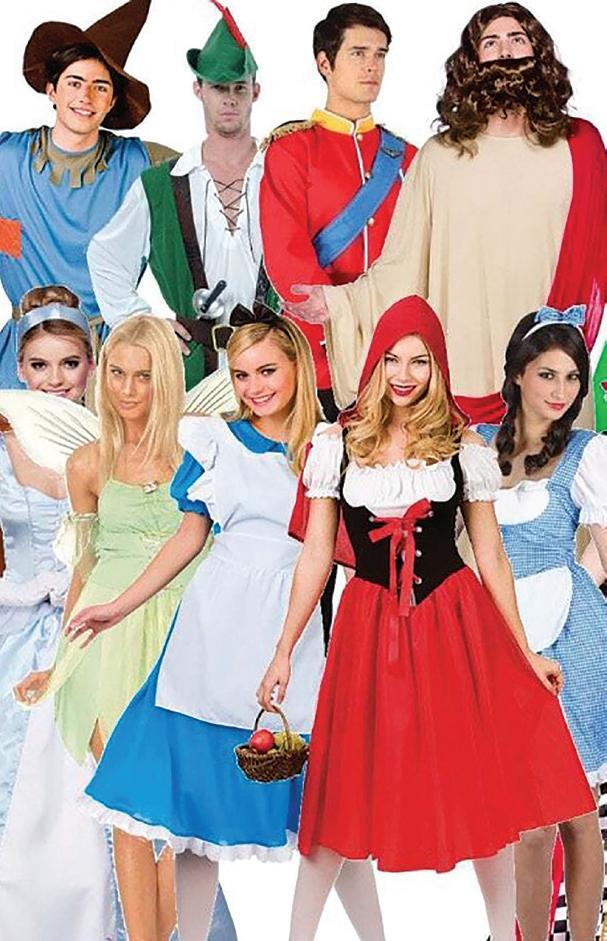
ONE respondent stated that “The Skiddle queue is designed to help manage demand rather than working on a ‘first come first served basis’ to those who click on the link prior to ticket release, it gives customers a fair chance of buying tickets, and keeps people informed of the status of busy event sales. The system is designed to prevent the platform from being overwhelmed, which occurred in the past with FIXR. It places individuals arriving before the sales open in a waiting room, assigning random access at the release time, while those arriving after are queued sequentially. This method aims to distribute tickets fairly among all potential buyers.”
Another key frustration for students is the amount of ticket reselling after all 7,000 tickets were sold out, with students on the Facebook group ‘Overheard at Uni
of Exeter’ selling tickets for double or triple the original face value of £60.50 only minutes after tickets were sold out. This suggested that many of these students were never intending to attend EGB and only bought tickets for the express purpose of selling them on. Respondents were particularly dismayed at this trend with one student saying, “It’s actually ridiculous that people are immediately selling tickets on Overheard for over £100 when tickets retail for £60.50. It shows that people are purely buying tickets for profit with no intention of attending the event.” Another said, “it’s very frustrating that resellers have been able to buy multiple to extort people for ridiculous prices; I have seen someone ask for offers of £120 plus, which is double the original price.”
In a statement by EGB on their Instagram story after tickets were
sold out, they said of ticket resellers that “unfortunately resale prices and the way people choose to distribute tickets to their friends are out of our control post-purchase.” Students criticised the ability to buy four tickets at once, making it significantly easier for resellers to bulk-buy tickets.
Some students criticised EGB as an event in itself. One respondent, identifying as the administrator of the ‘2exetah4u’ Instagram meme account (with over 3,400 followers), described the annual event as a “farce” where students go “into a field to buy drinks for a tenner then line up for like half an hour for some shoddy ride.”
Speaking generally about EGB, the organisers said, “We are grateful for the feedback from the student community and remain dedicated to enhancing the ticket-buying experience for the Enchanted Garden Ball. Our team is open to

ongoing dialogue and suggestions for improvement. We thank you for your continued support and understanding. We are continually working on our processes to ensure
the best and fairest outcome for our guests. Feel free to email hello@theenchantedgroup. com should people wish to provide feedback directly.”
IN December, it was revealed that the University of Exeter, along with 11 other higher education institutions in England, had been the recipients of government grants to undertake "a range of mobility projects focused on innovation and entrepreneurial skills development" in partnership with Israeli universities. The funding — provided by the Department for Science, Innovation, and Technology — will support researchers at all career stages to develop their expertise via international collaboration, with a focus on developing their skills in entrepreneurship and Technology Readiness Levels
(TLRs) innovation. Other universities partnering with Tel Aviv University include Aston University, Edge Hill, Queen Mary's, Teeside and UCL, with other institutions such as Greenwich, Royal Veterinary College, Leeds, Plymouth and Surrey partnering with the Hebrew University of Jerusalem, Technion, Tel Hai College, and Bar-Ilan University, respectively.
Jamie Arrowsmith, Director of Universities International (UUKi) commented: “We are very pleased to announce these awards, which go to such a worthwhile selection of projects as part of this new mobility scheme with Israel. These projects will provide a direct route for researchers to develop and learn from their counterparts in the region, and bring best practice back to the
UK. Israel is an important partner with complementary capabilities and expertise to the UK. The scheme will support areas prioritised in the UK Government Innovation Strategy and offer invaluable opportunities to build and grow lasting collaborations.”
Universities UK International is an organisation which represents UK higher education institutions globally and works with them to forge connections and collaborate internationally.
When asked for comment, the University stated that it “does not have any formal partnerships with Tel Aviv, but of course individual academics and projects may have links and collaborations related to their areas of expertise, and we support UUK programmes and UKRI funded research with a wide range of partner institution”.

The announcement comes at a time when students and activists around the world are calling for an immediate and permanent ceasefire in Gaza, and with widespread condemnation of the Israeli government's military actions, this does not reflect the opinion of many groups within the student population. On the 14th February, the Exeter Palestine Action group held a protest in the Forum against the University of Exeter’s “partnership with Tel Aviv University”, calling for an end to the “university’s complicity in the Israeli military industrial complex”. The university makes clear that it is not a ‘formal partnership’ but did not expand on what the UUKi announcement entails for the two universities. It appears that it is more a research opportunity for academics to participate in, rather than a formal partnership at an institutional level.
The Boycott Divestment and Sanctions movement, a Palestinian freedom movement, has claimed that Israeli universities work closely with the Israeli state to develop weapon systems and engage in military research. Tel Aviv University announced in October their “Erez” programme in which Israeli Defence Forces (IDF) officers are allowed to complete a full bachelor’s degree while in training to become officers in
the army. The scheme is funded by the IDF. The head of the faculty of humanities at Tel Aviv University, Rachel Gali Cinamon, praised the scheme as opening up the potential for an “educational dialogue that Israeli society needs.” This drew significant backlash from members of the University student body, especially Palestinian citizens of Israel such as Yousef Taha, the coordinator of the University’s student group affiliated with the Arab political party Balad, who claims the scheme “will turn campus into an army base.” These concerns are founded in worry that Israeli academia will become over-militarised.
The University of Exeter has previously been embroiled in international scandals involving institutional partnerships. Exeposé reported in 2021 on the controversy surrounding the partnerships with certain Chinese institutions such as Tsinghua University where academics are known for supporting and advocating for second-generation ethnic policy. One of the academics, Hu Angang, led Exeter’s institute for Contemporary China Studies, and has previously called for a “unified race” in China. Exeposé highlighted how this brings up serious questions about the complicity of the University in the treatment of the Uyghur Muslims in China.
WITH private education coming under increasing political spotlight, Exeposé has found the disproportionate representation of privately-educated students at the University of Exeter continues to pose barriers for those from less privileged educational backgrounds.
Last year, The Times ’ UK University Rankings revealed that 30.3 per cent of Exeter students in the 2022/23 academic year attended private school. Although this is lower than in any year between 2015/16 and 2020/21, it remains significantly above the national average. According to the Institute for Fiscal Studies, just 6.4 per cent of the wider population attend private schools, thus privately-educated students are overrepresented by almost five times in Exeter compared to the rest of the country.
Compared to other universities, Exeter remains among the institutions with the worst imbalance of private to state students. As of the 2022/23 academic year, it was ranked seventh in the country based on the percentage of privatelyeducated students — ranking above the likes of Cambridge and Bristol. The only universities to rank higher than Exeter were Oxford (31.4 per cent), Edinburgh (31.8 per cent), Imperial College London (33 per cent), St Andrews (36 per cent), Durham (39.1 per cent) and the Royal Agricultural University (39.5 per cent).
This comes as educational inequalities are set to form a major part of this year’s general election campaign. Sir Keir Starmer’s Labour Party, widely anticipated to win the election, plans to charge 20 per cent VAT on private school fees,
whereas previously these fees were tax-free, owing to private schools’ charitable status. Although Starmer dropped plans to end this charitable status last September, he still plans to enforce VAT on fees to increase tax revenue, and address socioeconomic inequality in the UK.
The University has attempted to improve the educational background imbalance through schemes such as giving contextual offers. These are offered to applicants from certain disadvantaged backgrounds, including those living in areas with low participation rates in higher education and who attend state school.
This won praise from many of the students surveyed by Exeposé, including one who noted the Exeter Scholars programme, which each year helps around 1,000 Year 1013 pupils from under-represented backgrounds to make informed choices about their future and progress into higher education. However, as the statistics above prove, this has not completely eradicated the educational imbalance at the University.
Inequality also exists when students arrive at the University, particularly in the form of finances.
One student told Exeposé that “the prices of certain parts of University are not accessible for me, [and] society fees, internships and study abroad support is not very accessible.” With last year’s HEPI Student Academic Experience Study finding that, for the first time, a majority (55 per cent) of university students in the UK were working part-time alongside their studies amidst the cost-of-living crisis, the financial inequalities faced by those from less advantaged educational (and thus socio-economic) backgrounds is an acute issue.
Moreover, student testimonies to Exeposé have made clear that the disadvantages suffered by state-
educated students do not end with being under-represented on campus, or suffering financial difficulties. Among those who attended state schools, 50 per cent (13 respondents) felt that their educational background had put them at an academic disadvantage whilst at Exeter.
This has often manifested as missed opportunities in comparison to their privatelyeducated counterparts. Multiple students noted that private schools tended to offer extra preparation for university life compared to underfunded and overstretched state schools, such as CV and personal statement guidance, as well as significantly smaller class sizes.
One state-educated Exeter student reflected, for example, that “a lot of my secondary education was self-taught due to underfunding of my school so there weren’t enough teachers and the teachers we did have weren’t very good. There were also a lot of misbehaving students which took a lot of attention from the teachers.”
Similarly, another shared that they found “the jump from a state school education to a university level was a massive one”, but that they “noticed those who went to private/ boarding [school] who were used to smaller more intimate and intense forms of learning didn’t have the same struggle.” They went on to describe the experience of coming to Exeter as a “culture shock”.
Consequently, respondents identified educational background as a bigger social, rather than academic, barrier. A significant majority (69.2 per cent, or 18 respondents) of state-educated students surveyed by Exeposé felt that their educational background had put them at a social disadvantage whilst at Exeter. Many referred to “circles” or “cliques” formed by privately-educated students that actively excluded those

from state-educated backgrounds.
One student noted that “privately educated students often come across as very out-of-touch with normal people”, echoing another student’s remark that “they are extremely out-of-touch with the real world, whether it be who they know/ nepotism, where they go on holiday and general day-to-day finances.”
The idea of the “culture of Exeter [being] geared towards private school culture” was echoed by numerous students who gave testimonies to Exeposé. For example, one cited “the University and Guild turning a blind eye to certain societies’ conduct… [which] often perpetuate the inequalities and discrimination… [meaning] us state-educated students are left to feel excluded and marginalised.” Similarly, another student argued that “events at Exeter are specifically designed to the privately educated, such as the Races and EGB.”
Respondents raised the issue that this culture often manifested as stereotyping and discrimination towards those from less advantaged educational backgrounds. For example, numerous students stated hearing “povo jokes” and remarks such as “state school scum” and “you don’t belong here, go back to your apprenticeships.”
In response, the University told Exeposé : “The University of Exeter is deeply committed to widening participation by engaging, inspiring and attracting the very best students, regardless of their background.”
They noted their work with local schools and colleges in the southwest to encourage students to consider higher education, as well as their wider national programme of secondary school engagement.
The University went on to state that “these initiatives, and our unwavering dedication to welcoming students from all backgrounds to our community, two out of three current UK students at Exeter are from the state sector”, although they did not note that this still remains significantly disproportionate to the national figures, with around 93 per cent of the population attending state schools.
The Guild also spoke to Exeposé regarding this issue, stating that: “We are committed to ensuring all students have the same opportunities and access, whether this is academically or socially.”
They mentioned, for example, their Hardship Fund which, in collaboration with the AU, “allows students to apply for up to £50… to cover costs such as membership fees, kit and event tickets.”
THE Clay Pigeon Shooting Club has clarified that a member, who was involved in an incident in which a dead deer was seen being carried through the Forum, has been permanently expelled from the Club.
The Club also wants to make
clear that their activities are limited exclusively to sporting purposes and that they in no way engage in or support the shooting of animals.
According to an anonymous post on the Overheard at Uni of Exeter Facebook group, the deercarrying incident took place on the 19th January. Pictures taken in the Forum show the deer slung over the shoulders of a male student, who is accompanied by another male. They bought the dead animal from a game
dealer before carrying it through campus to Birks Grange Village.
Armed police were present at Birks Grange and students there had guns and hunting knives, according to a screenshot of a text message that was posted on the Facebook group Parents and Carers of Students at the University of Exeter.
The University is investigating and says it has offered support to students who raised concerns about the incident.
An article for Exeposé Online,
quoting an anonymous source, revealed that the two students were affiliated with the Clay Pigeon Shooting Club and the Conservative Association (EUCA).
The RSPCA is also investigating. A spokesperson for the organisation said: “We’ve been given information about an upsetting incident involving a deer which has allegedly taken place at the University of Exeter. We are liaising with the police and are making enquiries and looking into
what is reported to have happened.”
A spokesperson for the University of Exeter said: “We have been informed that two students purchased a dead deer as venison from a game dealer and brought it onto campus to their residence. We have investigated the incident and spoken to the students involved as well as offered support to students who raised concerns. We have not concluded every aspect of the investigation so will not comment further at this stage.”
ANATIONAL Nature Reserve (NNR) located near Budleigh Salterton is set to be extended. This becomes the third addition to the King’s Series, which will see 25 NNRs be allocated in the coming five years to celebrate the King’s coronation. His Royal Highness aims for this project to reconnect the public with natural environments whilst also promoting biodiversity in the area. Natural England announced this extension in East Devon,
and its chair, Tony Juniper, also expressed the importance this has for "nature recovery". The mudflats and saltmarshes that make up the 90-hectare Otter Estuary Nature Reserve will join the King’s Series.
This extension of the Pebblebed Heaths National Nature Reserve will also encompass the area of the recently completed Lower Otter Restoration Project. The £27m scheme led to the creation of a 55-hectare intertidal habitat, where the wetland landscape supports wintering birds, according to the Pebbled Heaths Conservation Trust, and this includes rare birds such as the
oystercatcher. Landowners Clinton Devon Estates partnered with the Environment Agency (who provided the majority of the funding) to improve resilience to climate change. Wetlands are excellent natural stores of atmospheric CO2, acting as the perfect solution for capturing harmful greenhouse gases and mitigating climate change. By becoming affiliated with the reserve, Dr Sam Bridgewater (from Clinton Devon Estates) noted that it recognises the conservation value of the site. As more reserves are added to the King’s Series, it shows a country-wide commitment to conserving areas of beauty in England.

ST. Petrock’s, a local homeless charity, is launching a fundraiser encouraging people to sleep under the stars on the 12th April to raise funds for its work with rough sleepers.
The St. Petrock’s Big Night Out will see participants sleep out in areas such as their gardens, garages and warehouses. Participants will be checked on twice during the event, once at 21:00 through a Zoom call, and again the following morning. Local businesses have donated at least five prizes for the fundraiser for categories such as ‘most exotic loca -
tion’, ‘most elaborate shelter’ and ‘participant furthest from Exeter’. Prizes include two complimentary tickets to the Let’s Rock 80s Festival at Powderham Castle, four complimentary tickets to Scott’s Cinemas and a £50 voucher for Petrock’s Place.
St. Petrock’s director — Peter Stephenson — said of the event, “people’s experiences on Friday the 12th April won’t compare with the physical and mental trauma of being homeless of course. However, it’ll be a fun way to raise money for our life-saving work supporting rough sleepers and a chance to reflect on what it might be like to have to sleep rough out of necessity. Sadly, homelessness in Exeter continues to rise, with our staff

providing more home-cooked meals, showers, emotional support, clothing and sleeping bags to rough sleepers, than ever before. Between 25 and 35 people are sleeping rough on a typical night in the city centre, but there are many more people who are homeless and hidden from view, either sofa surfing or sleeping in cars, for example.”
Claire Wright, Community Relations Manager, added, “We will send a St Petrock’s Big Night Out pack to participants once they have signed up, which includes information on how to stay safe and warm, promotional materials and how to get sponsorship.”
All participants who wish to sign up should do so at www.stpetrocks.org.uk.
THIS ARTICLE CONTAINS CONTENT RELATING TO SUICIDE WHICH SOME READERS MAY FIND DISTRESSING
LAST month, a Bristol high court ruled against an appeal from the University of Bristol over the suicide of a disabled student in 2018.
Natasha Abrahart, a 20-year-old physics student with chronic social anxiety disorder, took her own life in April 2018, on the day she was due to give a presentation to over 300 students and staff as part of her degree.
In May 2022, a judge ruled that the University of Bristol was guilty of failings contributing to Natasha’s death, and ordered them to pay £50,000 in damages. This ruling stated that the University had violated the 2010 Equality Act on the grounds of negligence and disability discrimination.
The University of Bristol appealed the judgment in October 2022, which was heard in December last year. On the 14th February, the court rejected this appeal.
Natasha’s parents stated that they hoped this ruling would prompt politicians to introduce a statutory duty of care
for students. Natasha’s mother, Margaret Abrahart, told Bristol student newspaper Epigram in March 2023: “I would say it feels very empty. [The University] make public statements saying that they’re sympathetic to the family. It doesn’t tend to feel very genuine when they haven’t said that to us.”
Her father went on to say: “They’ve never admitted anything. They’ve never said sorry. We publicly asked for a meeting to sit and talk with the senior managers from the University but we’ve got nothing. All we’ve ever met is their lawyers.”
In response to the ruling last month, Professor Evelyn Welch, Vice-Chancellor of the University of Bristol, said: “Natasha’s death is a tragedy — I am deeply sorry for the Abrahart family’s loss.
“At Bristol we care profoundly for all our students, and their mental health and wellbeing is a priority and is at the heart of everything we do. We continue to develop and improve our services and safeguards to support our students who need help.”
The University clarified to Exeposé in a statement that they would not be appealing the judgment further, and that the Vice-Chancellor has offered to meet with Natasha’s parents.
This ruling comes amidst a wider debate regarding universities’ duty of care to students’ mental health in recent years. In June 2023, MPs debated a petition calling for universities and colleges to have a legal duty of care towards students.
During the debate, Robert Halfon MP, Minister of State for Skills, Apprenticeships and Higher Education, called on universities to adopt the University Mental Health Charter Framework by September 2024, or risk facing licensing restrictions.
In November of 2022, the parents of Harry Armstrong Evans, a student at the University of Exeter who sadly committed suicide in June 2021, opened a parliamentary petition for ‘Harry’s Law’. In an attempt to save other students’ lives, this petition demanded that universities be legally compelled to disclose their annual suicide numbers as well as the departments in which these incidents take place. The petition received over 5,000 signatures nationally. Since then, Exeposé launched their own initiative last January (Student Pa-

pers for Harry’s Law) and an e-petition surrounding a statutory duty of care for higher education students was debated in parliament last June. This campaign falls in relation to the Abraharts’ own fight for justice with regards to student suicide, with the couple setting up the campaign groups the Lived Experience For Action Right Now (LEARN) Network and #ForThe100 calling for change.
Responding to these recent events in Bristol and to Harry’s Law, a spokesperson from the University of Exeter has stated that: “We are deeply saddened by Harry’s death and the family’s loss. Student health and wellbeing is always the University of Exeter’s priority, and we are acutely aware of the current mental health challenges for young people and the difficulties facing external services.” The University continued by commenting that they continually improve and review their wellbeing support and that they have “invested significantly in student welfare and wellbeing support in recent years to ensure students not only have access to our broad range of services. but also so anyone seeking support from our experienced and dedicated wellbeing staff is seen as quickly as possible in order to receive either initial, confidential assistance, or be referred to further specialist support if required.” The University also explained that they have invested significantly in student welfare and wellbeing support. This allows
students to have access to a broad range of services, and ensures that anyone who is seeking support from their wellbeing staff is seen as quickly as possible, so students can receive confidential assistance or be referred to further specialist support if required. Following recent, detailed reviews of the ways in which the University can support student wellbeing and mental health, the University have introduced further enhancements across their community. The University detailed that these enhancements include “developing additional structured training provision for staff, and investing in further out-ofhours support to ensure there is additional capacity within our trained team, who can proactively support students at their time of need. We are also working with key external partners in order to ensure the best possible support to our students.”
The Students’ Guild commented that they have been “hosting regular Wellbeing events on campus this academic year, including our Movember Talks, sessions on World Mental Health Day and more recently our Wellbeing Crafternoon workshops. Our Give it a Go events often provide space and activities which can improve health and wellbeing.” The Guild have also indicated that students looking for alternative activities have the option to “browse and join our many society events, and the Pitch Up and Play free sports programme, run by Exeter Sport.”
THROUGHOUT
February, the Exeter Girls Can programme has offered free or affordable opportunities for female students to get involved in physical activities.
The programme, which extended throughout late January and early March, was organised by the University alongside sports clubs and societies. Events included several football and futsal training sessions, tennis, running, lacrosse, powerlifting, sailing, fencing, basketball,
trampolining and rugby.
Exeter Girls Can follows the lead of the nationwide This Girl Can campaign. Launched by Sport England in 2015, This Girl Can aims to make exercise more accessible for women. Specifically, they want to make it more social, suitable, selfaffirming and safe (in their own words). According to Sport England, 2.4 million fewer women than men strongly agree that they enjoy physical activity, something they call the enjoyment gap.
A spokesperson for the University of Exeter said: “We branded this year’s campaign as ‘Exeter Girls Can’ with free or
discounted sessions provided for by our AU Clubs, as well as Exeter Sport. This included many new sessions such as ‘Neon Dance Fit Party’, ‘Run Club’, and ‘Exeter Girls Night In’, some of which we have already had requested to run again soon. With some sessions selling out in record time, we have seen a great increase in participation over the past month, as well as more engagement with our ‘This Girl Can’ interviews. We’re really pleased to hear that clubs will be looking to put these sessions on next year, and we cannot wait to keep providing a variety of activities for anyone who is interested".


FEATURES EDITORS: Benedict Thompson Henry Parker
THE path to victory for the Labour Party at the general election later this year has become all the clearer after two by-election results saw large Conservative majorities overturned in favour of Labour, marking the most by-election flips in any parliament in British history. Kingswood (a suburb of Bristol) and Wellingborough in Northamptonshire both took to the polls on Thursday 15th February after both of their incumbent Conservative MPs departed parliament early. Kingswood’s MP and former net zero minister, Chris Skidmore, stepped down voluntarily in protest of the government’s plan to allow new leases for oil and gas in the North Sea, against the spirit of a carbon-neutral climate policy. The ensuing by-election was contested most notably by the eventual victor — Labour’s Damien Egan — who had al -
THE two-hour monologue by Vladimir Putin, punctuated by a half-hour historical excursion, has capitvated global media attention.
Putin’s conversation with conservative American TV personality Tucker Carlson, the first with a westerner since the Ukrainian invasion, held significance. While many believe Putin offered nothing novel, his choice to speak out and with whom was significant.
Carlson’s claim that “not a single western journalist” attempted to interview Putin since Russia invaded Ukraine in February 2022 was debunked by Kremlin spokesperson Dmitry Peskov. Many journalists had requested interviews, including the BBC’s Steve Rosenberg, but only Carlson’s was accepted. From the outset, many believe the Kremlin designed this as a platform for Putin, not as an interview.
Controversially, Carlson has blamed America for provoking the Ukraine invasion. As well as this, in 2019, Carlson claimed that if it was ever a choice between Ukraine and Russia, “we should probably take the side of Russia.”

Only Carlson’s [interview] was accepted
ready been selected to fight the Bristol North East constituency and had stepped down from his previous role as the directly-elected mayor of Lewisham in London. The result saw a swing towards Labour of 16.4 per cent, overturning a Conservative majority of over 11,000, with Labour achieving almost 45 per cent of the vote.
Meanwhile, Wellingborough saw an even more dramatic swing away from the Conservative Party. The contest was called after its MP since 2005, Peter Bone, had been recalled by his constituents due to a report which upheld five allegations of bullying and sexual assault against him, including one which detailed him exposing himself to an employee while in a shared bedroom. The controversies did not end there as the local Conservative association selected Helen Harrison, a local councillor who is also Bone’s girlfriend. There had been reports by The Times that Bone had threatened to stand as an independent MP if Harrison was not selected. Regardless, a
swing of 28.5 per cent saw Labour’s candidate and former councillor and charity worker Gen Kitchen elected with almost 46 per cent of the vote. The third-placed candidate was Reform UK’s deputy leader, former MEP Ben Habib, who won 13 per cent of the vote, the best election result so far for the fledgling party.
The results saw the ninth and tenth by-election losses this parliament for the Conservatives, having now lost seats in all areas of England which were once considered safe, including Tamworth and Selby and Ainsty. The by-election serves as a useful reminder to the 1992-97 parliament which saw the Conservatives lose similarly favourable territory in eight by-elections.
The government have justified these repeated losses by saying that by-elections are always tough for incumbent governments. However, with a general election expected by the end of the year, these results are becoming starker. For comparison, the last by-election before the 1997 election in
Wirral South saw a swing of 17.5 per cent, less than either of the two most recent by-elections. The general election two months later saw New Labour win a massive 176-seat majority.
Time will tell whether these by-elections will create a similar omen for the upcoming election, but they certainly do not augur well for the Conservatives.

Carlson initiated with a question that could have been tough, asking why the US might strike Russia unexpectedly. Putin swiftly redirected, questioning the nature of the conversation amdist Carlson’s laughter. What followed was Putin’s routine recitation of talking points, coined a game of “Putin bingo”. This mainly consisted of a lengthy historical narrative which emphasised Russia’s claim to Eastern Ukraine. Putin was keen to allege NATO expansionism, CIA-backed terrorism in Russia, and US involvement in the Ukrainian Euromaidan revolution. He asserted Russia’s invincibility in Ukraine, framing the conflict as western-instigated. Despite Carlson’s attempts at journalistic direction, Putin’s monologue rolled on, leaving some to question whether Carlson was unable or unwilling to shift the conversation.

A game of “Putin bingo”
Carlson bypassed enquiries about Ukrainian war crimes or domestic repression but he did highlight imprisoned journalist Evan Gershkovich and implored Putin to release him as a gesture of decency. Throughout, Putin signalled a readiness for deals on his
terms, especially regarding Ukraine. He warned against foreign troop deployment beyond his own, hinting at dire consequences. While open to negotiation, Putin’s claims included retaining occupied Ukrainian territories, keeping Ukraine out of NATO and “denazifying” the country — claims which many have questioned. The interview aimed to caution the US against further Ukrainian involvement while signalling a willingness to engage, coinciding with ongoing military aid debates.

The interview aimed to caution the US
Carlson’s willingness to stir controversy by visiting Moscow aligns with his status as a right-wing figure. During the interview, Carlson emphasised the supposed threat of the “deep state,” echoing Putin’s claims about NATO expansion and questioning US governance.
While Tucker Carlson isn’t widely known in Russia, state media closely monitored his Moscow visit. Peskov’s focus on Russian reactions, rather than foreign ones, emphasises Putin’s paradoxical relationship with the west. Putin craves western respect while de-
nouncing its arrogance and hypocrisy. Russian cultural alignment with Europe intensifies this desire. Whilst exclusion from international events is certainly not a fatal blow to the Russian regime, it certainly is a bitter pill to swallow for many Russians, amplifying the need for western validation. Putin seeks western recognition of Russia’s equality, magnifying his domestic status. Even portraying Russia as a NATO threat bolsters his image, as seen in official media. Many will question whether it was worth Carlson being there at all.
Perhaps it would have saved everyone’s time if the Kremlin just issued a
state broadcast with Putin solo rather than creating the spectacle of flying a US journalist over. The interview comes at a time when there have been dramatic developments in the Ukraine War. There is a general assumption that the invasion of Ukraine, however tragic or unfortunate, will end at some point. Many feel, however, that this is entirely wrong, and that this is a war which the world will be stuck with in the long term. The question now is when the war will end, but more importantly, about how it will end. Carlson’s inteview, for some, may have served as a mouthpiece for Putin and his invasion.
Image:

Benedict Thompson, Features Editor, speaks to Jerome Starkey, The Sun’s Defence Editor, on his experiences on the frontline, President Zelensky and what has happened so far within the war

Jerome Starkey has bravely reported on the Ukranian War since Russia invaded on the 24th February 2022. He has beared witness for people across the world to see what is really going on in Ukraine. Benedict Thompson, Features Editor, sat down with Starkey to discuss his experiences reporting on the front line.
É: How did you get into journalism? I read you studied at City, University of London.
Jerome Starkey: I got onto the graduate scheme at The Sun. I applied in my third year at university. I did a bit of student journalism when I was at Newcastle and I wrote for the student newspaper there. I also did an exchange in America where I wrote for a student newspaper there also. That was amazing. Student newspapers in America have a circulation of 20,000, bigger than most local newspapers in England.
É: You were in Ukraine when Russia invaded on the 24th February 2022. What was going through your mind at that point?
JS: I came to Ukraine a week before the invasion. By the time they invaded, I had gone to Eastern Ukraine to Sievierodonetsk, and on the 23rd February I was visiting the old front line where there was quite a lot of artillery coming in. Then there was a Grad strike. The Russians fired a Grad missile at someone’s house, and that was semi-sensational because it was the first time a Grad missile had been fired for a long time. Grad is the Russian word for “hail”. Within 24 hours, there would be thousands upon thousands of them.
I woke in Sievierodonetsk at 4am in the morning staying in a motel with very thin walls and you could hear everybody’s phones buzzing, ringing and their alarms going off. It was all sort of chaos and panicking. The team I was working with was brand new. The driver, understandably, wanted to go back to his family in one direction and then the translator wanted to go back to his family in another direction. It was all quite fraught. I jumped in with some other British journalists and the next day we drove to Kharkiv in the northeast which is where I am now.
É: What has happened and has been happening recently in Kharkiv?
JS: Kharkiv is Ukraine’s second largest city. The northern edge of the city
is about 15 miles from the Russian border. On the first day of the war it was extraordinary. The city repelled a Russian tank assault. I got here on the 25th and we drove to the city’s ring road. And there on the crossroads was the turret of a Russian tank. We saw soldiers in the snow, in shallow shell scraps, digging into the embankment of the ring road. From that point on, and while we were there, everybody was diving for cover because there was artillery coming overhead. Two or three days later, we were still in the city and at least two patrols of Russian special forces drove into the heart of the city. It was very scary because there was no one on the roads. The only people on the road were the military and journalists. Refugees were going in the other direction. Wherever you went, there was a real suspicion of journalists for being a Russian saboteur, or a Russian agent or spy. At one point we got pulled out of our cars at gun point. It was scary. It’s always scary having people levelling loaded weapons at you.
Before that happened, me and two other British journalists from The Telegraph, great reporters, found ourselves chasing these Russian forces in Kharkiv to find out what was happening. We did not really know what we were looking at at the time but we subsequently have pieced together that a patrol of Russian Spetsnaz [Special Designation] had their tires shot at. We saw their vehicles, and as we were watching, a Ukrainian tank came up and opened fire at the building they were held up in. It was totally mad. Looking back on it now, I can’t believe we were that close to what we were seeing. I was literally 150 meters from the tank and because of the way the city is laid out and where we were, we couldn’t see where the building where the Spetsnaz were held up.
É: Could you tell us about your conversations with Ukrainian soldiers? What are some of the important things they have mentioned which struck you?
JS: Their sort of resilience and determination. In the first stage of the war, it was seeing civilians becoming soldiers, which was extraordinary. There were people leaping at the chance to sign up at the very first opportunity. I remember going to a Yoga studio in Dnipro after the war started, and there were civilians being trained with Kalashnikov rifles, and this
stays with me because I met one of the civilians who was there. He stood out at the time, he had coin sized earrings. I then met him four or five times. By chance the second time, and then by design after that. He was in Avdviika in the middle of February this year, and he was killed on the 15th February by a sniper. So in terms of what has stayed with me, from the beginning, it has been the courage of people determined to sign up. Journalists, we often get used to being called the weirdos who are running the wrong way, running towards trouble, while sensible people go in the opposite direction. But what you saw then was civilians in a sense going in the wrong direction but choosing to put themselves in harm’s way. I was struck in many ways. I also remember seeing someone who was evidently shellshocked in the first few days of the war. The soldiers are surprised because they think why on earth would a journalist choose to put themselves in those situations. But they are glad that people want to hear their story and they are incredibly generous once that initial surprise is over. I can tell you 100 examples of that.
É: Have you seen evidence of war crimes?
JS: I’ve been on a hospital ward where I have interviewed a dozen people who were civilians that had been hit by cluster munitions. I’ve also interviewed a child with his mother after he was effectively taken, held against his will, in occupied Crimea. He was living in occupied Kherson in the south and he went on what was he told was a school trip to Crimea. But while he was there, Russian forces retreated from the city, and then he was held in what we might call is a holiday resort, but a sort of summer camp for kids. He was held there with other Ukrainian kids who could not get back. There was no effort made to reunite him with his family. That is the war crime which the International Criminal Court indicted Vladimir Putin on which is the forced relocation of children. I’ve seen firsthand and spoken to the survivors of a cluster bomb strike near Donetsk.
In April 2022, I was in Kharkiv for six weeks and we regularly endured double tapped strikes, whether that is a war crime or not, but that is when a target is hit and then 20 minutes afterwards there is another wave of attacks on the same location which typically is done to target the first responders. Terrorist groups did that in Iraq and Afghanistan with suicide bombs. One bomb would go off and then another one would go off from it.

I’ve interviewed a child ...who was held
É: How do you adjust to everyday life back in England after reporting on these wars?
JS: I always have this kind of tension because I want to be back as quickly as possible to be with my family. But if I race back, I can turn up exhausted and wired because I am still in perhaps conflict reporting mode. So the tension is around pacing my return. It is quite a conscious
decision to maybe have a night in another country. Part of that is because Ukraine is such as huge country and you can’t fly into Ukraine anymore, you have to fly into a neighbouring country. So staggering the journey home is a way I try and get back home in a better frame of mind. I also usually take a few days off work just to try and rest and re-sit because it is exhausting. Any journalist on a foreign assignment will often work an 18-hour day, seven days a week, routinely, because there are on an assignment and they are away from the normal distractions and responsibilities, but here even more so far.

É: In you conversations with Zelensky, what were some of the most important things you talked about?
JS: The most important thing I spoke to President Zelensky about at the time was trying to convince American Republicans to support him and his country. That was back in November, when Republicans were stalling and are continuing to stall over the $60 billion aid package from the White House. America hasn’t sent a military aid since December and that is becoming increasingly urgent here, Ukraine is running low on ammunition. Strategically, that was the priority. Zelensky was also very interesting when I asked him about his relations with his top general Valeriy Zaluzhny. He was quite candid about that and subsequently we saw he has since been removed. There is no doubt that the relations between the two men were strained in November. Zelensky said he survived at least five assassination attempts. He said it’s a bit like Covid, after the first time it’s not so bad. That was a great answer, he had a sense of humour. He was very charismatic and engaging in that interview.

ficials are people whose focus is studying the war and understanding Russia’s ambitions. They said Putin has not given up his maximalist ambitions, and in some speak that means he remains hell bent on conquering all of Ukraine. He has not lowered his expectations. And they said he has no meaningful strategy other than slogging it out for as long as it takes until Russia mass begins to tell.
The most plausible explanation scenario that I have seen described is that Ukraine will at some point cede some of territory in exchange for NATO membership. And that would be painful for both sides. It would be painful for Ukraine to cede territory and it would be painful for Russia to accept its neighbor would become a NATO member state. But in a way a mutually painful peace deal makes it plausible.

I am still perhaps in conflict reporting mode Russia is prepared to soak up eye-watering levels of losses
É: In Putin’s interview with Tucker Carlson, he traced Russia’s history back to the ninth century in the context of the Ukrainian invasion. What is the length of historical period around Russia which people should be really be thinking about?
Zelensky said he survived at least five assassination attempts
É: What does the recent Russian victory in Adviivka mean in terms of the wider implications of the war?
JS: Adviivka is a blow for Ukraine. What strikes me as most concerning is that when you look at what happened in Adviivka and then when you look at what happened in Bakhmut, the Ukrainians will say that they managed to inflict very heavy casualties on Russia, and that is why they held out in those towns against overwhelming force. And yet when you look at it from the Russian point of view, it shows that Russia is prepared to soak up eye-watering levels of losses, of death, of casulaties, of equipment thrown into the meat-grinder if you like, for relatively modest military gains.
What we saw there was echoed last week in one of these briefings we sometimes get from the unnamed western officials. But these unnamed western of-
JS: In the UK, we are primarily defined by our geography because we are aligned and thus our geography hasn’t changed. Whereas a country like Russia or Ukraine is less defined by its geography because its borders have constantly changed and who controls each bit of territory has constantly changed. Therefore, the story of where its country started and its ancestry is far more important, and far more political. And that is true of Ukraine and of Russia. But as far as I understand, they both trace their roots to Kievan Rus which was originally a Viking trading post at Kyiv on the banks of the Dnipro river. Russia has this sense of itself as the great winner of wars because it was on the winning side of WW2, but it conveniently and spectacularly forgets the alliance between Stalin and Hitler before the Nazis invaded Russia. It forgets that to all intents and purposes it lost the Cold War, it withdrew from WW1 and lost the Russo Japanese War in 1905, and it retreated from Afghanistan in 1989.
É: What is your advice for students who want to pursue a career in journalism?
JS: Get involved. If you want to pursue a career in journalism, try it out and see if it’s for you. Try and work at your local paper, or your local radio or TV station. Have a go at blogging if you think that is what it is. Read the news, listen to the news, be interested in the news, and stay interested. And talk to people. That is what it is all about. It is about meeting people face to face and asking them questions and being interested in other people’s lives. I think that is the most fundamental thing. You have got to be interested in other people.
Joshua Smith, Deputy Editor, speaks to Alex Stanley, Education Officer at Exeter’s Student Guild, about his campaign to become Vice President for Higher Education of the NUS

THE elections for the National Union of Students (NUS) are underway, with announcements set to begin. NUS reps will be electing full-time Officer positions in 2024, to serve a two-year term. One of these candidates is Alex Stanley, currently Education Officer at the Guild, who is running for Vice President. Joshua Smith, Deputy Editor, sat down with Alex to discuss his campaign and what he stands for.
É: Could you briefly explain to those who may not know what exactly the NUS is?
Alex Stanley: Absolutely. So the NUS is the National Union of Students and it’s the Union that represents every single student in the United Kingdom. Its members are its student unions, who in turn represent students at individual universities. The majority of unions are signed up to the NUS, but there have been a few that have disaffiliated so that’s the sort of overall scope of the NUS. They also do a lot of work lobbying on the big issues that impact students. They’ve recently done a campaign on voter turnout — students could swing around 60 seats if they turned out in numbers equivalent to those in which the older folk do, and that’s something that they’re really trying to focus on.
Similarly, a lot of work is happening around the cost of living crisis. Students are really suffering at the moment, many people are having to choose between heating and eating. And that’s not a situation the NUS want to see anyone in. So there’s a lot of work being done there. Also, the renters reform bill is an area that I know the NUS are looking at, particularly around those section 21 ‘No fault’ evictions. The initial proposal was that students wouldn’t be included in that exclusion and the NUS have done a lot of work to fight hard to ensure that that change is made.
So a lot of work on a national level. It’s slightly different to the work that we do here at the Guild where we’re lobbying the University, the NUS, rather, are lobbying the government.
É: So how is the NUS
bying for students to have the best experience they possibly can at university and that starts with an NUS that the government actually listens to.
É : Could you reflect on some things which you think need changing in the NUS and some general ideas you have for the role?
run? What’s its leadership and election structure? Just give a brief overview of that.
AS: So the NUS is run reasonably similarly to a student’s union in the sense that ordinarily they would have a President and Vice Presidents, usually a VP of Higher Education, Further Education, and Liberation, and then they would have presidents for the devolved nations other than England. It’s run by an officer team with a trustee board similarly to student unions. The difference between the Guild as an example and the NUS is that policy is determined through a conference, a conference that each individual student union elects or selects delegates — we recently elected ours of 10 students, who we will be sending over to conference in Blackpool in April, and they will propose policy that will then be scrutinised through various committees of elected students. Through that process, the policy that those officers will be lobbying on will be determined.
É: So you’re really running to be part of this leadership team. Could you just briefly give an overview of what exactly the role you’re running for entails and what kind of things you’ll be responsible for in it?
AS: I’m running to be the Vice President for Higher Education. So that incorporates universities, degree apprenticeships to a large part differing from the Further Education role. My main responsibility will be liaising with the government and with universities on how we can make the student experience as positive as possible, and it goes back to some of those issues that we were previously talking about around the cost of living, around housing, around the hostile environment that’s been created for international students.
We’re in a situation where students aren’t being respected by government, where future doctors, nurses, teachers are being undermined and the government is making it as difficult as possible for students to have the experience that they should be having. My role would be predominantly lob -
AS: I’m running because the NUS fundamentally needs a fresh start. For 14 years we’ve been let down by a government that’s put profit over people in the sector, and we need an NUS that is fighting for students rather than shouting from the side-lines. I think there are some really big issues that the NUS needs to be working on, putting power back into students’ hands. The NUS has become overly bureaucratic in the sense that there are a few elected officers that not many know about. I want students actually involved in the change-making process beyond conference. I want to be setting up committees for all students and I want devolution at a fast pace — I’ve been pushing for NUS England. I want to see that go further.
I think we also need to be doing everything we can to rebuild trust with the Jewish and Muslim communities. It’s been a very difficult time, even before October the 7th for both communities, particularly within the NUS, so I think we need to be rebuilding trust there. On top of that, I know that whilst the NUS has been fighting within itself, it’s let down international and postgraduate students, both groups haven’t been adequately represented in my view. This is not entirely the fault of the NUS, the government have implemented a very hostile environment for international students and postgraduate students who are exploited financially, so I think there’s a lot of work that needs to be done and the NUS should be at the forefront of that campaigning work.
É: If you were elected, what would be your main priorities and goals?
AS: These come down to those three sort of points that I was talking about before — we had to be pushing on devolution, and there just isn’t that engagement, there isn’t that knowledge of the NUS, and that’s because no one works with the NUS! If you go back 15 years ago when top-up fees were being introduced, we had 50,000 students on the streets near parliament campaigning for that real change that students need and as a result the Lib Dems paid the price of letting students down. In the 15 years since, the marketisation of education has continuously failed students, and yet we’ve not seen a wide scale mobilisation of students and that should be the responsibility of the NUS. On top of that, there are niche issues that many students will be interested in, whether that’s climate action, whether that’s decolonisation of the curriculum, whether that’s mental health groups, whether that’s alcohol action, there are areas that students are inter-
ested in that the NUS currently isn’t doing enough work on, and that’s where I’d be looking to implement paid action groups to put students at the forefront of all of the work that the NUS are doing, rather than us turning up once a year at conference and not having much of an input.
I also think there’s a lot of work that needs to be done around rebuilding trust with Jewish and Muslim students. The Tuck Report into Antisemitism found that the way that Jewish students have been treated was absolutely unacceptable and the anti Antisemitism action plan alongside all the recommendations of the Tuck Report must be implemented on top of that. There’s a lot of work that needs to be done in terms of rebuilding that trust with the Muslim community, and that starts by reaching out to FOSIS and to Muslim sabbatical officers and students, which I’ve already started to do, because it’s fundamentally crucial that all students feel represented by the NUS, and I don’t feel that’s currently the position we’re in. And on top of that we know that because of the marketisation of education and the cap on home undergraduate fees, international and postgraduate students have been exploited financially for too long and that’s something I want to put an end to.
É: You mentioned that years ago there was a lot more engagement politically from students. What would you do to change this and make sure students are encouraged to be more politically active?
AS: I think students are angry. I also think they’re tired, I think they’re apathetic, and I think for too long there’s been a system that hasn’t worked for them and that we’ve entered this aura of normalised crisis where we just live with a failing system, and that’s something we need to really be pushing against, which starts with engaging students. I think that goes back to things like those paid action groups — actually reaching out to students and bringing them in while responding to the fact that students are time-poor by paying them. Also looking to do work on devolution — issues that are happening in Eastleigh aren’t gonna be the same in Edinburgh. I think, for instance, transport is something that where responsibility is devolved and the NUS can’t just have a couple of flagship policies which is going to save the day for every student.
Finally, I think I think we need to mobilise — when students are angry, we need to be letting the government know. I go back to those protests, 50,000 students on the streets, and that’s because the NUS were providing transport, doing big things on social media, making sure that students knew when protests were happening, how to get to them, and also making it as affordable as possible. I’d like to see a mobilisation fund set up within the NUS where
sponsors or donors can come in and bring funding in so that we can bring students to those protests and actually mobilise for an NUS that is standing up for all students, not just the 700 who turn up to conference.
É: What is your motivation for running?
AS: Well, I’ve been a delegate twice and I was re-elected this year and I’ve seen an NUS that just hasn’t worked. It hasn’t represented students and we’re becoming more and more frustrated, less and less united despite the fact that the government have been letting us down for so long, and that fundamentally comes down to the fact that we don’t have that unifying voice.
I think that I’ve got the experience both here in Exeter fighting for students for the last four years, but also on a national level working with the NUS for the last two sitting on one of their national committees to start to make that real change. In my role as Education Officer I’ve been meeting with sabbatical officers and students from across the country. I’m hearing what the issues are, and I’d like to think that with the help of the voters and of students and sabbatical officers from across the country, we can start to work on some of those solutions too.
É: What experience have you got which makes you a suitable candidate for this role?
AS: For the last four years, I’ve been fighting for students in Exeter, and for the last one I’ve been working as Education Officer for the Guild, and I’m proud of my track record fighting for students — from putting thousands of pounds back in students’ pockets through the industrial action compensation scheme, I’ve stood in solidarity with the UCU against the government that doesn’t value our sector, and I’ve campaigned on a national level within the NUS.
Touching on that last point, it’s really important that we have a Vice President who understands how the structures of the institution work, so that straight away we can get into working on the big issues that are facing students. I’ve been to conference twice, I’ve sat on the Democratic Procedures Committee, and I’ve got motions passed on democracy reform at conference. I’d like to think I have the experience to get going from the start.
É: What do you think the most important thing about the NUS is?
AS: It is the only national body that represents nearly every student in this country. I say nearly because there have been some disaffiliation, but the NUS represents millions of students and there is nobody like it. So whether you love it or hate it, it is our best chance at lobbying the government. If a Labour government does come in and takes the NUS off of the blacklist that it’s currently on, we’ve got a real chance to start making change for students.
Josie Sharp, International Editor, provides a timeline of Begum’s attempts to reinstate her citizenship
‘Convention to Reduce Statelessness’ laws.
SHAMIMA Begum’s latest appeal to reinstate her British citizenship has failed. At age 15 Begum left East London’s Bethnal Green for Syria, to live under Islamic State (IS). When IS fell in Syria, she was placed in a refugee camp by Syrian Kurdish Forces and expressed the wish to return to the UK. Her 2019 attempt to re-enter the country was barred by Sir Sajid Javid, the then-current Home Secretary for Theresa May. Sir Sajid revoked her citizenship, which was deemed lawful by the Special Immigration Appeals Commission (SAIC) in 2020. Despite this act being ruled as legal, this effectively left Begum as ‘stateless’, which in itself is a breach of the UN’s
She appealed this decision in the hopes of her return still being possible, but was once more denied. Two years later, her lawyers attempted to overturn the SIAC’s decision on Sir Javid’s decision with a new angle that the judges had not considered the potential trafficking/grooming circumstances. Whilst in Syria, Begum married Dutch Muslim convert Yago Riedijk with whom she had three children who all died in their infancy. Riedijk and Begum have since separated. Her endeavour was nevertheless unsuccessful, as the Court of Appeal once more sided with the actions of the Home Office. This is most likely not the end of Begum’s case, as her lawyers may appeal this decision at the Supreme Courts, but she will not be able to return for the proceedings and remains in Northern Syria.
Tom Richardson examines the controversy surrounding the President’s attempt to postpone his election

THE Constitutional Council, the highest court in Senegal, has rejected President Macky Sall’s decree which would have postponed the Presidential election until December. Earlier this month, hours before campaigning, the President had announced a decree to suspend the election indefinitely, justifying this over a parliamentary investigation into the eligibility of certain candidates.
The proposal was later agreed upon in Parliament, where lawmakers backed the move by a two thirds majority to extend the election by ten months. The vote was met with chaos, where many opposing lawmakers were forcibly removed from the chamber by police. The move was also expectedly met with mass opposition with protests occurring, demanding for Senegalese authorities to “protect our election” and campaigning for a “Free Senegal”. It has been called an attempt by Sall to cling onto power.
However, the Constitutional Council has ruled
the decision to postpone the election to be “contrary to the constitution”. The Council has ordered for the election to occur before Mr Sall leaves office on April 2nd, as the original scheduled date would no longer work due to such short notice. The President, who previously called the institution ‘corrupt’, has said that he would comply with the decision.
In a Foreign Office press release, the government stated their ‘concern at the uncertainty created by postponing the Presidential elections’, urging for their commencement as soon as possible. Many other countries have also shared concerns about the regression of Senegalese democracy, as it had a strong reputation for having a free and stable democracy. The west African nation has been ranked as the fourth most democratic nation in Africa, second to only South Africa on the mainland. Senegalese elections have previously been a beacon of democracy in a region with rampant political corruption and dictatorship.
Jake Avery, Music Editor, recounts his recent travels to an up-and-coming European tourist destination
FEATURING a gorgeous blend of lush greenery, towering mountains and crystal-clear lakes, Slovenia stands as one of the most se rene countries in Europe. Arguably the brightest gem of the region is Lake Bled (Bled jezero), a location that astonished me when I visited last August. Created 14,000 years ago after a glacial depression was flooded, Lake Bled appears as if it were plucked straight from the pages of a fairytale — it’s a bus tling hive of activity, with rowing boats and gondolas travelling across its turquoise surface, and a plethora of swimming locations scattered around the periphery. Rowing across

the lake is a fun challenge which allows you to reach the jewel lying at the heart of the lake — Bled Island (Blejski otok).
Image: Jake Avery
The reservation houses The Church of Assumption, a piece of Baroque architecture that also features a wishing bell that was installed in 1534. Walking around the Lake also makes for a relaxing and adventurous pursuit, and the best way to wind down afterwards is to try a staple of Bled’s signature cuisine, a mouth-watering slice of Bled Cream cake! If you’re visiting Bled and looking for another tasty treat, be sure to visit Mega Burger and try the Rauchy Burger — it’s phenomenal!
Harry Craig, Deputy Editor, discusses the law change in one of the world’s strictest Christian societies
ALTHOUGH contemporary ideas about gender and sexuality cannot be mapped onto the classical world, there is no doubt that conceptions of both in Ancient Greece were remarkably fluid. One must simply look at the poetry of Sappho, or numerous ceramics depicting gay sex, to realise that homosexuality is a part of the narrative of Greek antiquity.
Homosexuality is a part of the narrative of Greek antiquity
And thus the news came last week that the country to which many attribute the origins of modern ideas of homosexuality, had finally legalised same-sex marriage. Marriage equality seems like such a basic step that it can be easy to forget that it is legal in just 36 countries around the world, and remains unrecognised in almost all of Asia and Africa, as well as large swathes of southern and eastern Europe.
The significance of Greece’s move cannot be overstated. This is a heavily religious, socially conservative society, where the Church carries a significant amount of political weight. It is the first Christian Orthodox country to legalise same-sex marriage, and comes at a time where, elsewhere in Europe, LGBTQ+ rights are being restricted, rather than being extended.
Comes at a time where, elsewhere in Europe, LGBTQ+ rights are being restricted
Interestingly, it also came at the will of Prime Minister Kyriakos Mitsotakis, from the centreright New Democracy party. In a vote that had clear parallels with Britain’s own parliamentary vote under David Cameron a decade ago, many of Mitsotakis’ own MPs voted against the bill, and he had to rely on support from the left-wing Syriza opposition party (led by Stefanos Kasselakis, Greece’s first gay political leader) to pass the bill.
Clearly then, this move did not come without fierce opposition. Former Prime Minister Antonis Samaras told parliament that samesex marriage was not a human right and was “dangerous”. Similarly, the Orthodox Church have threatened to excommunicate MPs who voted for the measure, whilst the far-right Spartans party went even further to claim the bill would “open the gates to hell and perversion.”
Nonetheless, the law passed with ease, in spite of the usual clamours from all the expected quarters of Greek political society. Although progress on global LGBTQ+ rights in recent years has appeared to be glacial, and at points receding, Greece is a reminder that advancements can, and must, still be made.
Lisette Reed and Charlotte Zeyssolff
THE British Museum is once again facing repatriation calls, in this case to return its two Moai, statues from Rapa Nui (Easter Island). The museum has been inundated with demands to return the statues — over 1000 of them populate Rapa Nui and are revered for ancestral spirits — after Chilean influencer Mike Milfort encouraged other activists to flood the British Museum’s Instagram comment sections, prompting the museum to close its comment section on recent posts.
This is hardly the first time the British Museum have found themselves entangled in repatriation debates. There have been calls to return the Parthenon Marbles, Benin Bronzes, and Ethiopian Tabots to name only a few of the most famous cases. The call to return the Moai is not new: Rapa Nui issued a formal request for their return as far back as 2018 but despite appeals to establish an ‘open dialogue’ with Rapa Nui through visits by the island’s Council of Elders, the British Museum has so far refused to negotiate. Shutting down their comment sections is therefore in keeping with their attitude to the debate. The museum’s version
Tof ‘open dialogue’ seems to be to shut down all discussion.
Part of the problem is the refusal to acknowledge, or attempt to remedy, the close connection between colonial histories and the Moai’s current home. It’s no secret that the British Museum is a treasure trove of colonialism. Founded in 1753 at the height of the British Empire, many of its acquisitions were brought to the UK through theft, brutality, and subjugation. The museum’s Moai, originally stolen by a British surveyor in the nineteenth century and gifted to Queen Victoria, are no exception.

It’s no secret that the British Museum is a treasure trove of colonialism
Like many of the artefacts plundered by the British, the Moai carry strong cultural and spiritual connotations. In particular, the largest of the two statues is known as the Hoa Hakananai’a, translating to ‘the stolen friend’. Carved from hard basalt, marking it out from the softer rock of other Moai, and originally standing at the
site of the Tangata manu — an ancestral tradition in which men from different Rapa Nui clans would compete for governance of the island — the Hoa Hakananai’a is seen as a symbol of peace with immense cultural significance. This spiritual role is barely acknowledged by the museum or its visitors, hence the campaign to return it to its cultural context.

The Hoa Hakananai’a is seen as a symbol of peace with immense cultural significance
This is of particular significance given current debates over Rapa Nui’s autonomy from mainland Chile, and the fears that its distinct cultural identity is waning. The Moai provide education, culture, and art to the British Museum’s visitors, but as the ongoing online campaign argues, this pales in comparison to its importance for the self-identity of Rapa Nui.
Of course, the current campaign is not without its critics. Rapa Nui’s mayor, Pedro Edmunds Paoa, has pointed to concerns of politicising something so “holistically, spiritually

and culturally important”. There are concerns too that the architect of the campaign, Mike Milfort, is motivated more by increasing his standing as an influencer than by a genuine concern over decolonisation and repatriation.
The British Museum, too, criticised the use of social media, arguing that it threatens the security of collaborative posts and encourages ‘trolling’. It’s true that an institution which refused repatriation calls from international governments,
human rights campaigns, and academics, is unlikely to prove responsive to Instagram comments. Nevertheless, social media activism can still increase pressure on the British Museum and help raise awareness of repatriation debates and the museum’s deeply entrenched colonial legacy. It’s clear public opinion is beginning to turn against institutions like the British Museum, though whether that will eventually result in changes to its collection remains to be seen.
HERE has been a stark warning this week that women’s refuge charities may face an uncertain future due to their funding from local councils being cut. This comes at a time when many local authorities are having to find savings due to pressures from inflation and a lack of increased funding from the central government. Mary-Ann Stephenson of the Women’s Budget Group said that: “As local authorities are cutting to the bone, there is basically nothing left to cut, so everything that is non-statutory is going.”
These charities and refuges often deal with some of the most
vulnerable people in society, including victims of sexual abuse, domestic violence, and homelessness, with Stephenson adding that, “violence against women services are really among those most at risk.”

Refuges
often deal with some of the most vulnerable people in society
One example where the problem has been acutely felt is in Coventry, where the Coventry Rape and Sexual Abuse Centre (CRASAC) has been hit by a cut from the local council of £195,000, something the CEO Natalie Thompson said she was ‘gutted’ about. Additionally, an unnamed worker in the Violence against women and girls’ sector in London said that
“Working in the violence against women and girls sector over the last 3 years I have seen first hand the effects of cuts. Services I have worked for have been shut down and what that says to the women accessing the

services, often with complex needs and multiple disadvantages, is that they are not important or valued. [...] Even with the services which are still available, wait times and resources are limited and demand always surpasses capacity by a long stretch.”
The current crisis of funding is likely to hit especially hard in areas where councils have faced bankruptcy, such as Croydon and Birmingham to name a few, as spending on supporting refuges and crisis centres is discretionary, which means local authorities are not required by law to fund them. Additionally, areas of the country with higher-than-average rates of crime and homelessness may face a greater combination of issues. Campaigners have called on the government to provide more funding and support to councils
and charities directly, to ensure that these services do not disappear.
According to Refuge UK, a women’s domestic abuse charity, there is a call to the police every 30 seconds for help related to domestic abuse, which means that the centres run by charities are a safe space for people suffering at home.

There is a call every 30 seconds for help related to domestic abuse
If you need support related to any of the issues discussed here, or simply want more information about what you can do to help, speak to University Wellbeing Services, visit www.refuge. org.uk, or reach out to a trusted close friend or loved one for support.
YOU’VE only got three years of fun before real adulthood kicks in and your social life is threatened by the 9-5… so soak it all up, and attend as many Exeter events as you can. They are something to look forward to, presenting a beacon of hope and fun in an otherwise dull term.

With big Exeter events comes a camaraderie you don’t want to miss… even when things take an unfortunate turn for the worse. For example, the entire campus shared hatred of Fixr after the recent EGB scandal. Though it will make the 1st June all the more worthwhile, a sense of togetherness prevailing. EGB is a unique opportunity to dress up and soak up the good weather. You can’t get everyone together for society balls, so it’s a chance to invite everyone around before and have some final fun (and great pictures) before summer begins.
The races. Transport there and back, often live DJs playing bangers in between races, a day of fresh air: it all adds to the experience.
It’s the same for Varsity — which truly has something for everyone. Pints, chips, cheerleading and, of course, a gripping game of rugby. Not much else will make you feel so patriotic for your univer-
sity than screaming for the green players. Similarly, Unit 1’s recent closure is one that sparks emotions for those who went to their (sometimes dreadful) events. There’s a sentimentality about the place if noth ing else… did I flee the building after hearing ‘All I Want for Christmas Is You’ in November? Yes. But, if I was given the chance to zoom back in time for one last first year ‘Cheesies’, I’d take it in a heartbeat.


Not much else will make you feel so patriotic for your university...
The excitement and hilarity of finding what you like and don’t like is just too good to miss, and Exeter’s events do just that. So, do they live up to expectations? With the right people, absolutely. The university years are short, and the events deemed ‘iconic’ have probably been judged that by like minded students.
Emily ElliottWO-AND-HALF years into my time at Exeter, I’ve never been to Varsity, never been to the races, never been to Fight Night, never been to the EGB, and you know what? I sleep at night. I do.
Having never been, I cannot say for certain that these events aren’t worth going to. But I certainly don’t feel like I’ve missed out.
As it happens, I’m going to the EGB this year, because it looks like a fun way to celebrate finishing my degree. If you think you’d enjoy a particular event — and if you think it’s worth the often considerable money — you should go. Otherwise, don’t.

It is considered enlightened to value experiences over material things, over commodities, but taking a bucket-list attitude to the biggest dates in the “Exetah calendah” risks turning those experiences into commodities.
We should go to these events because we think we’d enjoy them, not because we feel we are in some way obliged to go, to

...it’s supposed to be part of the Exeter experience
be able to say we’ve been, to flaunt these must-have accessories to the Exeter experience. That way lies only unfulfillment.
I can understand the bucket-list attitude. FOMO is real. You only go to university once, and as for the money — since you are spending tens of thousands of pounds to be here, you might as well spend another few dozen to get all the extras.
But there’s no sense in doing something just because it’s supposed

That way only lies unfulfillment.
to be part of the Exeter experience.
After all, the quintessential university experience contains plenty of things that we’d prefer to avoid, like mouldy walls, the walk of shame, and bad parties.
(Actually, I once heard someone say that she wanted to have one bad party at university, so maybe I’m fighting an unwinnable battle here.) Your time in Exeter belongs to you, not to anybody else. .
Oliver Lamb, News EditorTash Smith discusses emerging trends of anti-ageing products amongst pre-teens and the damage it is causing
TEN years ago, being a preteen was characterised by a totally unflattering side parting, wonky teeth and making loom bands at lunch break.
Importantly, absolutely no knowledge of makeup or skincare, other than the odd Sprite flavoured lip balm from Claire’s. But today the story is very different, as we see the rise of Sephora-obsessed tweens, seduced by influencers’ advertising of luxury skincare items. Aside from needing to take a mortgage out to afford to even walk into the Sephora skincare aisle, many of these products, designed for adults, contain active ingredients like exfoliating acids and retinol, which are intended for anti-ageing and anti-wrinkle purposes for adult skin. Subsequently,
these ingredients can be extremely harmful to children’s sensitive skin.
Despite this, there is a concern that children are feeling pressured to use these products due to societal expectations of beauty and skin perfection. This is not helped by the rise in social media platforms as advertising tools, as now these preteens are constantly surrounded by TikToks and Instagram posts, sparking an interest in skincare.
These still-developing young people aspire to look like the beautiful 26-year-old influencer promoting their skincare routine in their in-
herently unrealistic ‘Get ready with me’ videos. This in-turn makes the vulnerable preteens want to emulate these skincare steps in the hope they too can look like their influencer idols.
Arguably, the skincare brands themselves are also feeding into this

No one will ever be able to stop kids wanting to grow up...
problem, by inadvertently marketing their products towards a younger demographic through their colourful packaging and “aesthetic” nature. But what can we do? No one will ever be able to stop kids wanting to grow up faster.
 ImImage: DevianArt
ImImage: DevianArt
Tweens want to act like older teenagers and nowadays, influencers too, aspiring to be like them and within that, want-
ing any product used by these influencers, which now extends to skincare.
However, the more that younger girls express interest in beauty and skincare, the more responsibility that lies within “trending” brands, such as Drunk Elephant and Glow Recipe, to educate their consumers about which products are safe to be used by different individuals. Responsibility also lies within influencers, such as TikTok sensation Alix Earle, to recognise the high number of tweens in their audience, whether intended or not, and ensure they are advocating self-confidence and self-love. A focus must be placed on encouraging impressionable tweens to appreciate their individuality, instead of reinforcing toxic beauty norms that trickle down to the younger generation..
BREAKING NEWS: prime minister Rishi Sunak assures only recession in the UK is that of David Cameron’s hairline.
In a speech delivered by the prime minister after Prime Minister’s Questions today, the 6th March, Rishi Sunak lambasted the Foreign Secretary — David Cameron — in a bizarre personal attack on his receding hairline and (perhaps more bizarrely) his “dead trim.” Political commentators have heard off-therecord comments from Conservative MPs that Sunak is suffering from ‘small man syndrome’ due to the statesman-like stature of the former prime minister on the world stage. Below follows the speech in full.
“Mr Speaker, I rise today to address the attacks from the Leader of the Opposition (who as we all know is a great friend of the Rt. Hon. Member for Islington North) regarding the economy. He says that the economy is in recession but the thoroughly encouraging data from the ONS showing the economy growing by 0.001 per cent in the last fiscal quarter shows how thoroughly out of touch he is with working-class Britons.
“I recently had an opportunity to visit some of these Britons in an inner-city school and one A Level politics student commented to me that the only recession he can see was the hairline of the Foreign Secretary, the noble peer of Chipping Norton, which — to quote the young man — was a “f***ing dead trim”. Personally Mr Speaker, I could not have agreed with him more.
“I am of course a massive fan of the Foreign Secretary but I’m sure even he has recognised that his constant flights to warzones around the globe has taken a toll on his once youthful looks, and in fact is rather resembling my first choice, my parliamentary predecessor Lord Hague of Richmond. I merely remark upon this Mr Speaker because some on the opposite benches and in the press gallery have suggested that the Foreign Secretary would make a more able prime minister than myself, and in fact already is, but I assure this House and the nation that he is no more a head of government than he is possessing a full head of hair.”
Charlie Gershinson, Deputy Editor

BELOW we provide the perfect itinerary for your day at the rah-ces!
MORNING
10:00: A perfect breakfast: cereal with a side of tequila, for the gut health, naturally. 11:00: Slip into my fox fur coat vintage, for ethics, of course. Daddy sent me his old cap to wear but it didn’t go with my coat so I made him buy me a new one!
NOON
12:00: Join the queue for the coaches, admire fur and
leather combinations. The chinos and caps are a little predictable from the boys, but they’ll do. The queue for the races is Exeter University’s fashion week.

The queue for the races is Exeter University’s fashion week
13:00: Finally pull up to the races. Next time we’re so paying for a taxi. Watched a girl get escorted away from the racecourse by two security men. Poor girl, she’ll never get that smell out of her minx fur.
14:00: Just as well my boots are
knee high, so is the mud. The queue for the loos was about a mile long, but so was the line of chaps pissing in the field next to the track.
15:00: And they’re off! Horses charging, a blur of checked shirts and glossy brown coats careering onwards. “Come on Swifty!” (Mummy knows the dealer, so placing a bet was a must).
16:00: We head to the rave tent! Sniffer dogs, a bit of coke, champers and all. The thud of music resounds across the tent, an echo to the public sat firmly in their wellies on the benches opposite.
EVENING
17:00: Energised by a rave and
chugging a not so classy voddylemonade, we were ready and raring to bet. It’s a must at the races, or why go? Lost a fair bit of the trust fund but you only live once!
18:00: Just to top off the day, afters are essential! A tad awkward to see the guy I hooked up with at TP last night what a blast to the past! It was hardly the drinks reception one would expect, but good enough.
19:00: Slump in bed, a mess of damp leather, mud-coated boots, smudged mascara. Gosh, now time to call Daddy, check the bank account and beg for a little more of the allowance!
vertising any event besides EGB.
READY, set, break FIXR. Not the most typical of Monday evenings, but one l am sure will not be forgotten. As students prioritised their alarms for the Enchanted Garden Ball (EGB) over waking up for lectures, starting off the week well and getting an EGB ticket seemed synonymous. Student households across Exeter reported immeasurable levels of stress Monday evening, as households assembled every possible device to log in to FIXR and debated whether a phone or laptop had better odds. Yet as 6pm hit (or 5.50pm for those of you valued Exeposé members), FIXR got stage fright and either crashed or started ad -
As societies quickly panicked that they had sent the wrong link to members (or maybe that was just me) news of the great FIXR crash of 2024 spread like wildfire. As al ways, Overheard provided some much-needed laughter in these moments of panic. While one student began by asking for everyone’s best offers for their zero tickets, others felt disappointed in their Apple ‘ecosystems.’ Another rightfully emphasised FIXR’s frustrating inability to listen to the first three letters of its name.
bear another DM from the city’s angry/sleep-deprived students.
A few moments later, they even posted an image simply stating that FIXR had died, and we are all cordially invited to relive the stress at an unknown date next week.

While the scams have already begun, it seems that acquiring tickets (to drink overpriced Venoms in a field) will prove more difficult than trying to see Taylor Swift.

EGB itself quickly responded to the matter, as it could no longer
Acquiring tickets... will prove more difficult than trying to see Taylor Swift
The next round and it seems FIXR once again cannot handle students’ eagerness to drink Venoms in a field. The chaos caused has left students comparing FIXR to that ‘one toxic ex you keep going back to.’ Others continue to question whether EGB has even heard of Ticketmaster and whether at this rate we will have better luck using a friend’s garden to recreate the event. While for many it seemed the third time was the charm, others have been left with a newfound hatred for Skiddle. To paraphrase the new drama One Day — “It’s one of the great cosmic mysteries how Skiddle can go from being a total stranger to being the most important app on your phone.”







ATE Winslet has been a consistent role model in my life. From the English town of Reading to the whirlwind that is Hollywood, she has become a household name across the world. Whilst navigating this complex and challenging creative industry, she has remained true to herself and her values. Her commitment and dedication to the filmmaking practice is reflected in her numerous accolades, fame, and various successful roles portraying headstrong women. She is the youngest actress to have received five Academy Award nominations. My favourite portrayal, like many other young women, is Rose from James Cameron’s Titanic (1997). Although working alongside young Leonardo DiCaprio as his lover would be a dream for anyone, it was also her down-to earth personality behind the camera that I found
writers discuss an important woman in their lives and why they are so special to them
inspiring; a friendly face but also hard-working. Having watched much of her work at a young age, I think she sets an outstanding example for any young girl to follow.
Eloise Grainger, Sport Editor
ILIKE to think that when you find someone who understands you better than you understand yourself, it’s important to hold them close. My younger sister Lily is that person for me. Not only is she my sister but she’s also my best friend and often, my therapist. She’s driven, smart and absolutely hilarious and she is the only person that can make me laugh even when my eyes are full of tears. But I shouldn’t just praise her for what she does for me — she has had a variety of obstacles thrown at her in life so far but she pushes on and
finds another way and I know that she always will. Lily is an absolute inspiration to me and despite being my little sister, I see her as an equal: the first person I turn to with good news, the first I turn to with bad and her advice is like gold dust to me. She deserves nothing but success in life and I’m so grateful to have been part of her journey through all 19 of her years so far. I’m excited to see where life will take her next and I’ll be right there with her.
Gracie Moore, Online Arts and Lit Editor
WHILE I feel blessed to have many important women in my life, I want to take this opportunity to show my gratitude to my Nana. One of the most hardworking, kind, and thoughtful women, she has taught countless life lessons to everyone in my family. Above all, my Nana taught me the value of being present, flying over every Christmas, always video calling to speak, and sending the most adorable (sometimes hilariously misinterpreted) Facebook gifs

to brighten our days. It is also thanks to her I learned how to crochet, sew, and knit. Her artistic talents were unmatched, from gorgeous paintings to handmade birthday cards. Always putting others before herself, her gift-giving was her special way of spreading love. Her smile was contagious and even through incredibly tough times she never failed to make us all laugh. As she always used to tell me, "don't worry, be happy" — and as I go through life, remembering her will make me focus on the little things — to smile and enjoy life as opposed to letting it pass me by.
Anabel Costa-Ferreira, Editor-in-ChiefIT'S that time of the day when you have prepped a hearty meal and dug your sports shoes out, ready for the warmup of Forum Hill and contemplating what playlist to blast. For some, music might be a vital part of a routine, as ‘Best Workout Playlist 2024’ manages to hype you up enough to get through the gym door and finish that final set. This really can be make or break on a bad day, as the sea of students queueing for machines, crushing PB’s or congregating in workout groups becomes too much to handle. If so, you are not alone, as hunkemoller recorded that 28 per cent of women and 16 per cent of men feel intimidated by public workout spaces. Fortunately, there are various solutions to overcoming this apprehension, mainly in concentrating on making the gym experience your own.

HUNKEMOLLER RECORDED THAT 28 PER CENT OF WOMEN AND 16 PER CENTOF MEN FEEL INTIMIDATED BY PUBLIC WORKOUT SPACES
This begins before you have even left the house: choose an outfit that you feel the
most comfortable in, regardless of whether it is colour-coordinated or uni stash. Feeling at ease in your own skin will help improve your routine, and ultimately your sense of satisfaction at the end of your session. Next, have a focus, and follow the ‘know before you go’ idea. Coming up with at least a rough plan allows you to start small and build big once in the gym. It is true that a lot of gym anxiety might stem from the uncertainty of what to do or appearing ‘unprofessional’. However, there are countless routines on platforms such as You Tube and Tiktok to talk you through the first steps. Still stuck? Ask for a free 10-minute trial session with one of the loitering personal trainers. Trying to follow a routine you like is great, but never be afraid to ask for help; despite protein shakes or Lululemon sets or resistance bands, everyone has been in your
position. Going with someone can also be a great way to share some of the responsibilities, pumping each other up on the treadmill or just serving as friendly moral support.

More importantly, don’t forget to stay positive about the gym, even when you are not working out. UK active released a report which proved that physical activity enhances your wellbeing mentally, physically, academically, and can even improve employability. Reflecting on this and bringing a good energy will make a huge difference to your gym outlook. This could be through listening to a podcast by gym influencer Anna Archer, who talks about her journey and inspires others to persevere with theirs, watching some of your favourite sports, or diving into Brian Keane’s 2023 novel The Fitness Mindset. Even taking up a new activity or trying yoga for the first time before workout
days can really help improve your confidence in an exercise environment. You never know who you might meet, or what you might be able to achieve (no matter how small).

ARE NOT WORKING OUT
The gym is simply a place for likeminded people to reach their goals, and the idea improving yourself should be celebrated as something that is empowering.

CELEBRITY culture broadens peoples’ interests, introducing them to new activities and ideas through diverse celebrity endorsements. It invites you to join a community of like-minded people, fostering friendships, online or in person. Wearing fan merchandise out I’ve had people come up to me and its sparked conversations between us — it’s a great way to introduce yourself to people as a fan of the same person, opening pathways into friendship.
IT'S A GREAT WAY TO INTRODUCE YOURSELF TO PEOPLE AS A FAN OF THE SAME PERSON, OPENING
Celebrities often have good relationships with their fans. As a fan it can be easy to put celebrities on a pedestal, so it is important and especially connecting when they remind us they are normal people too, with potentially similar problems or insecurities. Speaking publicly on these, their fans may relate and admire them for speaking out, leaving them feel less alienated and encouraging more people to talk about perhaps typically unspoken issues, such as Jorgie Porter talking about her acne on I’m a Celebrity Get me out of Here in 2015.
This can be the same for creating an open dialogue about mental health issues too.
Similarly, celebrities are often a form of inspiration for their fans. They can raise awareness of societal problems and call for change. For example, many celebrities took part in the Black Lives Matter protests. Seeing someone people admire act encourages them to do the same, curating important dialogues in an indirect approach which may foster stronger ideals. Celebrities often have a huge following and so can influence a lot of people which — when used kindly —can improve society, encouraging positive social transformations.
Rachel McEwan
SOCIAL media has seen modern celebrities step off the red carpet and into our daily lives as a community of ‘aspirational’ superiors. Due to the popularity of short-form content, public figures remain permanently connected with their audiences, extending their personal brand with a backstage pass into their lavish lifestyle.
While it is entertaining to live vicariously, these carefully curated insights are a recipe for negative comparison as they peel back a curtain to yet another carefully constructed façade. There is an overwhelming amount of content that promotes superficial ideals of success, where material wealth and widespread recognition signify the pinnacle of prosperity and happiness. More worrying is the perpetuation of unrealistic beauty standards and filtered lifestyles that rely on cosmetic procedures, heavy editing, and a full time PR manager to curate a highlight reel that feeds into mental health struggles like anxiety, depression and eating disorders for those on the other side of the screen.
In a climate where anyone can leverage

their 15 seconds of TikTok fame to market themselves as an ‘influencer’, celebrity status has morphed into a commercial endeavour to capitalise on harmful trends that market diet plans and weightless drugs to an impressionable audience, using the names of their idols as a stamp of legitimacy. The abundance of unqualified endorsers exploiting the negative side of celebrity culture make it vital that we evaluate the values admired by society and seek authentic content from celebrities that use their platform responsibly, with the well-being of their audience in mind.
Jess Laffan
SCROLLING on my phone to find something to listen to and make that walk to campus that bit more bearable (Exeter hills I’m looking at you), I was drawn to the bright colours and funky cover of 'Goes Without Saying.' It goes without saying, you shouldn’t judge a book by its cover, but in this case hosts Sephy and Wing are just as vibrant as their stunning design. Releasing two episodes a week, and always leaving me wanting more, 'Goes Without Saying' is a one stop shop for conversations on navigating your 20s including friendship and dating, as well as lots of pop culture references and giggles. It’s the perfect combination of insightful discussion and silly jokes to remind you that no one is perfect, a refreshing break from narratives of self-improvement and productivity which are suffocating on social media. The podcast feels like a conversation with friends and has been a big comfort throughout my time at uni.
Milly Earnshaw-WhiteAS someone who listens to a lot of hard, often depressing, news podcasts, it’s important to switch off. When I am feeling something a little lighter, I listen to the 'Polyester Podcast.' A ‘feminist pop culture’ discourse podcast, taking a deep dive into current trends and events to offer insight and comedy. It’s an informative podcast but doesn’t feel overly rehearsed, keeping a casual tone to match the content.
Recent episodes include ‘The Taylor Swift Tipping Point’, looking into a change in public attitudes towards Taylor Swift, and ‘Why Are 10 Year Olds Engaging in Ten Step Skincare Routines?’, questioning the rationale behind ‘Sephora kids’ and the connection to ageism and classism. The podcast is hosted by Polyester’s Editor-in-Chief Ione Gamble and Gina, another Polyester employee, and is produced by Olivia Graham. The Polyester Podcast is available on all podcast platforms.
Florence NewINSIDE 'Anna’s Mind' has been a lifesaver during tough times with my mental health. Anna Archer, lifestyle and fitness influencer, started her social media journey during her mental health struggles to document her fitness journey—however upon realizing the toxicity of social media and the disordered behaviours in the fitness community, she began recording podcast episodes to tell her viewers about what is really inside her mind. The podcast episodes vary from lighthearted life updates, sport obsessions, and failed life updates, to raw episodes about her childhood and mental health journey. She is very open about her anxiety and experiences in therapy, as well as navigating her eating disorder recovery as a lifestyle influencer—which has helped me during my own recovery. Her podcasts do not follow a set schedule, but there tends to be a new episode every few weeks. The relaxed style and honest confessions create a warm environment, which makes listening feel like a phone conversation with an old friend.
Amberly Wright, Lifestyle Editor
MY love affair with the audiobook began whilst I was slogging my way through Great Expectations for a first-year English module. It was 500 pages for two weeks of lectures and seminars, but my academic FOMO was not about to allow me to just read the spark notes. Feeling utterly defeated, I found a free online audiobook of Great Expectations , put my headphones on and went for a walk down Exeter Quay. The middle-aged male voice actor putting on a high-pitched, girly voice for the character of Estella, and an old lady drone for Miss Havisham had me hooked. Now, half of the books on the syllabus I listen to, flipping back in my physical copy

to make notes and place a few sticky tabs. Classics are always available on online library services such as BorrowBox, and consuming ‘important’ literature is far more fun whilst walking around Exeter. More recently, with the advent of Spotify’s 15 hours a month of free audiobook listening, I have discovered my love for nonfiction audiobooks. This was an inevitability really, given my extensive consumption of podcasts, but as someone who struggles to stay engaged whilst reading non-fiction, the huge spike in availability of affordable, exciting non-fiction has been a game changer. Despite the positive impact that audiobooks have on increasing the number
Oof readers in the world, which invariably is a good thing, there are implications with regards to how the growing access to audiobooks through third party providers affects the profits of the authors. Amazon claims that authors will receive 40 per cent of the royalties if they choose to distribute exclusively through Audible. com, Amazon.com or iTunes, or 20 per cent if they choose to also distribute elsewhere.

THEY FAIL IN SPECIFYING HOW MUCH THE AUHTORS WILL BE PAID
According to Forbes, with regards to the new 15 hours a month with Spotify Premium system, authors and publishers will be paid for the percentage of a book listened to, or for the length of time that the book is listened to, however they fail in specifying how much the authors will be paid for these hours of listening. Although they report paying ‘tens of millions’ to audiobook publishers, the Society
of Authors ‘remain concerned at the lack of clarity about the deals,’ pointing out that many publishers are leaving their authors in the dark about their deals with audiobook subscriptions. Whilst the availability of audiobooks is fantastic for increasing the amount of literature consumed by the public, it is important to keep the authors in mind.
That being said, my absolute favourite audiobook is Pandora’s Jar , by Natalie Haynes. Natalie Haynes is a classicist and standup comedian, and Pandora’s Jar is a wonderful combination of her two professions. It is a nonfiction book about the representation of women in Greek myth, and is narrated by Natalie Haynes herself, who does the perfect job at bringing her book to life. Admittedly, I have owned the physical copy of this book for years and it took me listening to it to get me past the first chapter, but maybe buying a physical copy of a book as well as listening to it is the best way to support the author and actually get around to reading the book.
VER the past few years, we have seen a substantial increase in theatre ticket prices, abandoning younger audiences and their inability to afford such high prices. Actors such as David Tennant, Ralph Fiennes and Andrew Scott have called for revaluation on the prices which are subsequently reducing theatre to be an elitist art form.
The theatre struggled during the Covid pandemic, being forced to close due to pandemic procedures for over a year. Even when the theatres were allowed to reopen, limitations on audience members restricted the earnings the theatres could bring in. Consequently, we have seen a rise in theatre prices.
As Harriet Sherwood, Arts and Culture correspondent of The Guardian, mentioned last summer, shows such as Cabaret and A Streetcar Named Desire had theatre prices going for around £300 each.

Whereas some students may be able to find this sort of money, I am certainly not one of them. While I adore the theatre and would love to see more of what the stage has to offer, I simply cannot afford the seat prices.
While many theatre companies offer reduced prizes for students, the fees of travelling, and sometimes accommodation, the costs are still too much to justify. It seems some celebrities agree.
In an interview with Laura Kuenssberg, Ralph Fiennes suggested the need for prices to fall, commenting they could do it at a lower price. He mentioned that 20 per cent of the tickets for his immersive Macbeth would be between £15£20, making it more accessible for the majority.
SBy continuing to keep the prices rising, we’ve run the risk of the theatre being an elitist opportunity. David Tennant, who has worked closely with the Royal Shakespeare Company, agreed that their theatre seats have become unreachable for younger audiences on the RadioTimes podcast in September last year: “you’re strangling the next generation of an audience coming through.”
For an art form which has been developing since around 6 BCE where Ancient Greeks began to present

dramatic performances, it is heart-breaking to see theatre becoming exclusive. Theatre has always been aimed for a general populace, with standing tickets being a single penny in the Elizabethan era.
As Tennant and Fiennes agree, we need to address the height that theatre prices are continuing to reach and the impact this may have the next generation. If it becomes inaccessible for the majority, will the theatre survive?
Maya Fernandes, Online Music Editor, talks about her favourite assigned reading
AM Selvon’s 1956 novel, The Lonely Londoners is a seminal work in postcolonial literature, offering a portrayal of the immigrant experience in post-war Britain. It is a text which I studied in the second year of my English Literature degree, and one which shaped the way I view post-war Britain for the lives of many. Selvon, himself an immigrant from Trinidad, provides a nuanced depiction of the challenges faced
by Caribbean migrants as they navigated life in a foreign and often hostile environment. When Nigerian poet Helon Habila wrote about the novel in 2007, he commented:
“The message of The Lonely Londoners is even more vital today than in 50s Britain: that, although we live in societies increasingly divided along racial, ideological and religious lines, we must remember what we still have in common — our humanity.”

THE MESSAGE OF THE LONELY LONDONERS IS EVEN MORE VITAL TODAY THAN IN 50S BRITAIN
This sentiment holds true in my reading of it almost two decades later. The Lonely Londoners is a timeless masterpiece that continues to resonate with readers
Image: Nuno Ferreira
today. Selvon’s keen insights into the immigrant experience, coupled with his complex characters and evocative prose, make this novel a must-read for anyone interested in themes of migration, identity and the search for belonging.
Image: Brewbooks, Flickr.. Image: Rawpixel.com Image: Rawpixel.comEDITORS:
Maddie Conlan & Lauren WalshFANTASY is a genre that can be daunting to new readers, as starting a new fantasy book often comes with unpronounceable character names, pages and pages of complex world-building and complicated magic systems. But fear not, dear reader, for we are here to simplify our favourite genre for you and give those interested an easy route in! The first 50 pages are normally a drag but, once you’ve braced the info-dumps and learnt your world, you’ll be flying through mystical lands and wonderful worlds like a pro. Fantasy refers to books which contain magical or supernatural elements. This can range from hidden magic worlds behind our own (think Harry Potter ) or completely different worlds (think Westeros from Game of Thrones ).

IT’S JUST THAT ANY WORLD IS INFINITELY COOLER WHEN THERE ARE DRAGONS IN IT
The appeal of fantasy lies in its ability to defy the bounds of reality and provide escapism: when you read a fantasy book you leave behind the real world and issues like exams and finances, and instead join a world full of prophecies, lost princesses and ancient swords. It’s not that the real world is necessarily that bad, it’s just that any world is
infinitely cooler when there are dragons in it.
The classic books that spring to mind include J. R. R. Tolkien’s The Lord of the Rings trilogy, which can be credited with transforming the genre and creating many of the conventions that we still see in fantasy books today. The Game of Thrones books are also extremely popular and were integral in fantasy’s break into mainstream adaptations. Other big names in the genre include Robert Jordan, Robin Hobb, Neil Gaiman and Terry Pratchett. These authors of legend encapsulate the traditions of classic fantasy, but since their time in the spotlight new names have come to the forefront of this vast genre.

There are also many sub-genres within fantasy and one of our favourites is the new, and highly popular, Romantasy. Dealing with heart-stopping, sexy romance in a fantasy setting these books include fated mates, brooding love interests and
protagonists that have world-shattering powers. Some famous examples of Romantasy include TikTok sensation Fourth Wing , and anything written by Sarah J. Maas. Young Adult and Urban Fantasy, set in places like New York but with werewolves and witches, are also good entry points into the genre, as they tend to be easier to digest. The title most well-known in Urban Fantasy is the Shadowhunters series by Cassandra Clare. Though it’s a 15+ book commitment the romance and plot in these books are addictive.
If the classic fantasy of the 90s doesn’t appeal to you there is a world of literature to sink your teeth into. An amazing entry point into the genre is one of the modern legends Brandon Sanderson, who rose to fame when he finished writing the last books of Robert Jordan’s epic The Wheel of Time
There are many ways to enter Sanderson’s extended universe and also enter the fantasy genre as a whole. Our personal favourite comes in the form of
HE Night Circus by Erin Morgenstern is a book filled with fantasy, magic and intrigue. Erin Morgenstern weaves an intricate tale of romance and mystery, that centres two protégé rivals, Celia Bowen and Marco Alisdair, in a bid to win a magical competition where there can only be one victor.
The plot follows the journey of Le Cirque des Rêves (The Circus of Dreams) as it disappears and appears suddenly without warning, visiting a range of cities such as St. Petersburg to New Orleans. Set in the Victorian era, Morgenstern sweeps you up into a world of the impossible. Fire eaters. Illusionists. Fortune Tellers.
The narrative largely follows Celia and Marco, however Morgenstern smatters her chapters with a couple of other POVs, specifically through the awed eyes of spectators.
Magic engulfs every page of this book. Cloud mazes, ice gardens and a candlelit wishing tree paves the way for a mystical read.
This book will stay with you for a long time, the ambiance pulls the reader into the story and I would definitely recommend!
Emily Alexander
IHAVE found that fantasy is a difficult genre to get into, especially if you haven’t read much before. The world building can be overwhelming to start with and following along becomes difficult.
Many novice fantasy readers tell new readers to start with easier reads to bring you into the genre — this is my recommendation. Six of Crows is a wellloved duology which is very popular among fantasy readers and is the perfect way to get into the genre.
The book follows a group of outcasts as they try and pull off an impossible heist. It’s fun and full of suspense and heartfelt scenes. The world around them is also insanely interesting and has a rich history that you learn about as the series goes on. You really get to know the characters well as the book changes between their perspectives.

FOLLOWS A GROUP OF OUTCASTS AS THEY TRY AND PULL OFF AN IMPOSSIBLE HEIST
The book is made for young adults so the world building is easy to follow along, without it seeming too childish. I love this series and it is the perfect way to introduce yourself into the fantasy genre.
Kayleigh Swart, Screen Editorhis Mistborn trilogy. Beginning with The Final Empire , Sanderson describes this as a world where villains like Voldemort won, and we follow Vin, a street urchin who gets caught up with a band of rebels trying to overthrow the evil leader of their world.
You could also start with Warbreaker
A stunningly, lyrical adventure that follows two sisters and how their lives diverge around the will of immortal gods. With a captivating romance at its core, the light-based magic system of Warbreaker is easy to understand and love.
If easy-to-engage-with fantasy is not your forte we dare you to indulge in Sanderson’s epic The Stormlight Archives . An epic that spans years, The Stormlight Archive follows an ensemble cast in Roshar, a world ruled by storms and war, where everyone is fighting for the power that ‘shards’ hold, and how that can turn the tide of battle.

OUR UNDYING LOVE OF FICTIONAL WORLDS, CAN CONVINCE YOU TO PICK UP A STORY
Fantasy is, in our correct opinion, the best genre of fiction and we hope our guide, and our undying love of fictional worlds, can convince you to pick up a story you wouldn’t have before.
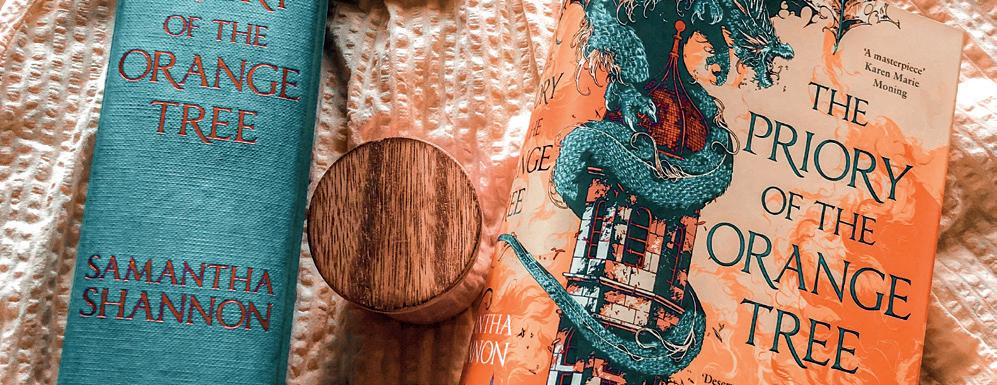
THE Priory of the Orange Tree by Samantha Shannon is a phenomenal novel, both in its narrative and its writing. At a whopping 800+ pages, Shannon describes The Priory as a ‘feminist retelling’ of George and the Dragon.
Told from multiple perspectives, the reader is drawn into a fantastical world of dragons, magic, and political intrigue. The story is split across multiple kingdoms, following three female leads.
Queen Sabran rules in Inys, served by Ead, a mage hailing from the South. The two have opposing views and personalities, but Ead’s dedication to protecting Sabran creates an emotive bond between the two. Across the sea in the East is Tané, a trainee dragon rider, whose fate becomes intertwined with a Western trespasser, seeking to unite the East and the West under the power of dragons. Driving the plot is the increasing threat of the Nameless One, a fire-breathing wyrm who makes an unsettling return.
The Priory is incredibly diverse, with an engaging plot and a great slow-burn romance, even if some perspectives are more enjoyable than others. Shannon has also written a prequel to The Priory, A Day of Fallen Night, and The Bone Season, another fantasy series.
The Priory of The Orange TreeMalik Awotorebo, takes a look at the Beyoncé's new country endeavours and her hopes to redefine the stereotypes of this genre.
SHE got her boots, and her hat; she’s bringing country back (sorry Alan Jackson). Beyoncé, who basically invented the surprise drop, released two new tracks after the screening of her Super Bowl commercial for Verizon. The two tracks — '16 Carriages' and 'Texas Hold ‘Em' — are the first taste of the long-awaited Act II of her three-act project which aims to reclaim the black roots of various mu sic genres: her previous House/ Dance album, being Act I. After months of waiting, days of hoping and sleepless nights, with no signs of visu als (say it with me: “You are the visuals”) and the lamp of a live album losing oil, Beyoncé has finally brought the cattle out to graze (for clarity, we are the cat tle and she is feeding us).

springs to mind. She is slipping back into those boots. '16 Carriages' is a slow, boot-stumping, guitar-accompanied ballad about struggle and family strife. 'Texas Hold ‘Em' is more upbeat, and stereotypically a hoedown track. Twangy, banjo-ridden, and whimsy. It’s my preferred track of the two. I’m tickled by this mainstream return of country (and folk) with Kacey Musgrave’s album announcement, as well as Lana Del Rey’s country album announcement for Lasso, and now Beyoncé too.
it was just a few days after the release, so maybe they were just uninformed that one of the most popular artists in the USA was dipping her toes again in country music. Or maybe black people have frequently been excluded from country music, or at least being the face of the genre.
'16 Carriages' and 'Texas Hold ‘Em' are not Beyoncé’s first foray into the genre. ‘Daddy Lessons’ from Lemonade is a song that

'Texas Hold ‘Em', Beyoncé's 9th (Billboard) No. 1 more than two decades into her solo career, is the first country No. 1 from a black woman. Unsurprisingly, it took a while to be picked up on (American) country radio who were also hesitant to play Lil Nas X’s 'Old Town Road' (another black country hit) a few years ago. What makes these two tracks not country enough for country radio when (to me at least) they sound like your standard country song? Was it because they were made by artists who don’t particularly position themselves as country artists? Fair. Did Beyoncé’s team also not initially send her singles out to country radio? True. Is it because they’re both black? Likely. In 1962, when Ray Charles released Modern Sounds in Country it brought success to the genre and introduced it to a new audience, but it failed to be recognised as a country album (because he was black if that was not implied). It was instead played on pop, R&B and easy-listening radio. Ray Charles’ contributions to country would later be recognised by the Country Music Association in 2021.
When 'Texas Hold ‘Em' was requested by Justin McGowan on KYKC (an Oklahoma country radio station)

Hillbilly music, a precursor of today’s country music, was a white-marketed genre which saw many of the black performers uncredited for their contributions to the performance. When black people have been integral to the formation of country music: with the modern banjo, one of the faces of the genre (instrument-wise) having roots in instruments played by enslaved West and Central Africans; many black musicians like Gus Cannon mentoring country legends like Johnny Cash; gospel being a key component of country. Just to quickly highlight hillbilly’s coloured counterpart, “race records” the ‘genre’ that was marketed to black individuals (because assumptions were made that people bought music according to race) and would eventually evolve into R&B (rhythm and blues). This segmentation has roots in Jim Crow — a pejorative for African-Americans and a set of laws that enforced racial segregation. Hillbilly, and so country, has always been propped as a white genre — a return to the rural white American south —when that’s fundamentally untrue. Even today, artists of colour make up only three per cent of country airplay (a majority of those are from male artists). Black artists, like Cleve Francis, have historically been shut out of country music radio. From country music in general sometimes, like Linda Martell (who was

blackballed and faced with racism during her performances despite being a successful country act) and Tina Turner who earned an R&B Grammy nomination for her debut (country/folk) album, Tina Turns The Country On! It’s important to remember that radio doesn’t fully showcase the landscape of music.
I’m very excited for everything Beyoncé has in store for this act, and her bringing black (female) country artists like Linda Martell, Rhiannon Giddens, Tanner Adell, Reyna Roberts, K. Michelle, etc. to the forefront by just partaking in the genre.
Image: Etsy, Wikimedia Commons, Flickr
After seeing Idles in Bristol on 17th February, Joshua Smith, Deputy Editor, reflects on the band's lyricism and sound
AS kids we have role models — people we look up to, copy, try to emulate the behaviours of, they’re the people that sit on the brink of our mind when we make decisions and those that you measure yourself up to. These people are somehow bigger than life, or at least bigger than your own little life, and are almost deified in your mind’s eye. I can’t say I have had many roles models in my life, and those that I did have weren’t always in my family, or within my close friendship group, but then family is a funny thing isn’t it? It’s language and mannerisms frame your experience, guide your navigation of life, and yet for the majority of my late teens and early adult life I have been in a constant state of reflection about who exactly these people are to me; precisely the hyper-awareness of their influence in the way you act, speak, and express your emotions brings me pause: who are they now? I have a more intimate access to that sense of existential introspection inherent in adulthood, and specifically early adulthood. My emotional development was always a bit fractured, warped, confused, to the extent that I latched on to people and things from a place of rejection, anger, selfishness. Idolisation is a complicated affair in
the whirlwind of this over-emotional, over-stimulated child’s brain. This dawned upon me on a Friday last week when I unexpectedly came face to face with one of the most important people to me growing up. He’s an old family friend, my dad’s best man at my parent’s wedding, and someone I saw as what a man is, and should be in this world.
All sounds rosy, doesn’t it? But with this I take recourse to Larkin’s famous verses: ‘They f*** you up, your mum and dad./They may not mean to, but they do./They fill you with the faults they had/ And add some extra, just for you.’ My parents certainly contributed quite a lot to my many f*** ups, but I’ve always seen the process that
Larkin compares to the deepening of a coastal shelf as something more Ballardian: a crumbling façade of civility, the seemingly perfect front of the family with a crumbling psychological inner working, tearing itself apart from within. Meeting this old friend brought back many high and low memories, and made me reckon again with what it meant to me, and what it means to me now, to be a man in this world. Soon after meeting him, I went to a concert by the post-punk band Idles. If you know anything about them, you’ll know it’s not farfetched to say that their music is cathartic: a simultaneously introspective and wildly expressive performance looking back into the past,

but reminding you of the present. Seeing them for the first time after many afternoons blasting them out to my mum’s annoyance in the kitchen while cooking was something which can’t be replicated, not merely because of how cathartic it was, but the many histories which parallel mine and reflect the sentiments of an existential whirlwind of an upbringing. But it’s also the mechanism by which I don’t care anymore. In moments of the concert, gradually purpling my arms in the mosh pit, things didn’t matter. Look at me go!

Their new album, Tangk, is a celebration of everything they’ve done so far, and traces the paths Joe Talbot has taken to get to this point in his life. Since the last album Talbot has become a father, as I’ve become an adult, and the time in between has been a series of memories, f***-ups, loves and hates, each bringing a new perspective on past idolisations, emotions, vulnerabilities… as the old phrase goes “we’re just men, we're just innocent men.”
EDITORS: Jake Avery and Scarlett Cracknell
WITH the recent release of the biopic Bob Marley: One Love, perhaps many people have wondered where is Reggae, dancehall, ska, etc. in today’s musical landscape? Since Bob Marley, no Reggae artist has since been able to achieve the same musical height. Yet, in the 80s and 90s, the likes of Yellowman and UB40 still experienced great success in the British music scene. In search of artists still carrying the torch of reggae today, Chronixx is a great artist to look to.
Born Jamar McNaughton on October 10, 1992, in Jamaica, Chronixx has emerged as a powerful voice in modern Reggae, by blending traditional elements of Reggae with innovative sounds and thought-provoking messages. Chronixx's journey as an artist is deeply rooted in his cultural heritage and upbringing. Growing up as the son of Jamaican artist Chronicle, Chronixx was exposed to the rich musical offerings of Jamaica from an early age. As such, it took Chronixx only until the age of five to compose his first song “Rice Grain”. Deeply influenced by Rastafarianism, Chronixx has embarked on a mission to carry forward the legacy of Reggae while infusing it with his own unique perspective.Chronixx seamlessly blends traditional Reggae rhythms with contemporary production techniques, creating a sound that is both nostalgic and fresh. Songs like "Here Comes Trouble" and "Skankin' Sweet"
exemplify this, and pay homage to the classic Reggae sound while adding a modern twist.
Yet, Chronixx’s biggest success in the UK has perhaps come in the form of a remix of one of his songs by legendary DJ Shy FX, titled “Who Knows”. This infusion of Reggae and drum and bass shows the true versatil ity of Chronixx’s music. Yet, this is probably not surprising to Chronixx, given he regards his own music as “black experimental music” rather than simply just Reg gae, and as such, he looks to tap into all black musical tra ditions in his own work.
Beyond his musical prow ess, Chronixx explores a myriad of cultural heritage and themes in his lyrics. His songs serve as a platform to address social issues, celebrate Jamaican culture, and advocate for positive change. From songs that speak out against

injustice and inequality to ones that celebrate love and unity, Chronixx's music resonates with audiences around the world, transcending boundaries of language and culture. It is because of this that Chronixx's music serves as a beacon of positivity and optimism.
Chronixx reminds us of the enduring power of Reggae music to uplift spirits, unite communities, and spark meaningful change.
Through his unwavering commitment to his craft and his dedication to spreading messages of love and unity, Chronixx has solidified his place as one of the most influential voices in modern Reggae. Whilst Reggae perhaps does not occupy the same standing as it once did in the British

PROMINENT musicians have the right to stand up for what they believe in, just like anyone else. The only difference is some have millions of fans, who observe these opinions, sometimes becoming a source of controversy as to whether they should speak up for political issues, or keep entertainment and politics/social issues separate. When given the opportunity, many music superstars have been credited for facilitating huge social change, which will be discussed in this article. The ability of megastars to speak up on topical issues given their level of influence and power is completely warranted, and one shouldn’t have to relinquish their right to freedom of speech once a significant following is obtained. Music sensations shouldn’t be restricted from expressing their beliefs, as it creates the impression that issues of great importance are out of reach, and not to be cared about by the layperson. Singer-songwriters such as Sam Fender use their freedom of speech to express disdain for wars going on, such as his self-aware lyric in 'Hypersonic Missiles' ‘God bless America and all its allies/ I’m not the first to live with wool over my eyes/ I am so blissfully unaware of everything/ Kids in Gaza are bombed and I’m just out of it’. Celebrities using their plat-
forms to discuss issues that trouble them, but also express their disconnection and ‘unawareness’ of it all gives listeners without prior knowledge in conflicts accessibility to the political issue and perhaps the confidence to read more about it.
Taylor Swift is another music star bringing about social change through encouraging education, using her enormous platform to deliver the importance of the right to vote. A great example of this is her encouragement of the ''thoughtful, self possessed people who have turned 18 in the past two years'' to vote, in an Instagram post that gained over two million likes. This post similarly considered Marsha Blackburn, who was elected to the US Senate in Tennessee in the 2018 midterm elections, educating her fans of her homophobia and unfeminist ideologies. If even a fraction of the people liking this post took the opportunity to educate themselves, and then vote, Swift has helped empower members of society, helping to mould a generation of politically engaged young people. This shows how great influence can be used to make elections fairer, as young people are historically underrepresented. Expressing views often has a huge impact over a target audience. This has been seen in responses when countries use music superstars as public relations stunts, such as to profit from their exposure at events.
Nicki Minaj declined an opportunity in 2019 to play at Jeddah World Fest in Saudi Arabia due to their damaging policies for women and LGBTQ+ people. Arguably, such a decision will have motivated thousands to learn more about these laws, increasing awareness as she spoke to Associated Press about her desire to deliver to her fans but also to "make clear (her) support for the rights of women, the LGBTQ+ community and freedom of expression.'' She was later praised for this thoughtful decision by the Human Rights Foundation. Such advocacy through action, and abstinence from endorsing certain events, is to be commended. Whilst dangers such as the spreading of misinformation exist, which has the capacity for damaging socio-political consequences, music stars are often held to high standards and the expectations of their fans. With such huge power and standards, there is a need to be responsible for educating themselves to stand up for the rights of our most vulnerable members of society. When this happens, music stars and their platforms can form unstoppable vehicles for social change and campaigns for political involvement.
music scene today, Reggae’s influence on today’s music is as strong as ever, from the likes of Kano in the British grime scene to junglist Nia Archives all being inspired by Reggae.
Furthermore, M Dot R’s recent explosion on TikTok with songs such as “Turn Red”, shows that Reggae can still live on and succeed in the British music scene, signifying the fact that innovation rooted in Reggae can prove to be a successful recipe. Reggae has often been synonymous with one love, and it is its ability to unite audiences around the world, disregarding race, religion, etc. that is what makes it so special and loved by all of us. Nevertheless, a greater appreciation of the struggle behind the music is perhaps more necessary in Western audiences, so that reggae can live on and be understood in its entirety. Ye Mon!

Maya Fernandes, Online Music Editor, reviews Adrianne Lenker's latest single

AHEAD of the release of her new album Bright Future, set to come out next month, Big Thief vocalist Adrianne Lenker has just dropped her third new single, 'Fool.' The tune adopts the same characteristically quiet and sentimental feel of Lenker’s indie folk discography, but co-producer Philip Weinrobe has hailed its rare evocations of optimism: “it’s easy to forget that Adrianne can do unbridled ecstatic happiness just as deftly as every other emotion in the human experience.” 'Fool' has a comfortingly melodic feel, particularly in accompaniment with its music video, which was directed by the artist’s brother, Noah Lenker, and features a heartfelt montage of the Lenker family playing in the snow. Born and raised in the American Midwest, Lenker's musical journey began at a young age. She first gained widespread recognition as the lead vocalist and guitarist of the indie folk band Big Thief, which she co-founded in 2015. The band quickly garnered critical acclaim with their debut album, Masterpiece, and subsequent releases like Capacity and U.F.O.F. Lenker embarked on a solo career in 2018 with the release of her album Abysskiss; this individual venture allowed the artist to showcase her talents more fully as a singer-songwriter. Her 2020 albums Songs and Instrumentals are firm staples of my study playlist, with their hauntingly simplistic lyricism and introspective themes providing the perfect soundtrack for a productive day on campus. Lenker’s new album Bright Future is out on March 22nd, and she is preparing to embark on a European tour in the months to come. As she continues to evolve as an artist, both in her solo career and ongoing work as a member of Big Thief, one thing remains certain: Adrianne Lenker's voice will continue to resonate for generations to come, a testament to the enduring significance of folk music in the modern age.
Kayleigh Swart, Screen Editor, shares her opinion of the decline of the MCU
THE Deadpool 3 trailer has just dropped and the casting for The Fantastic
Four has just been announced and a lot of people are starting to wonder, is the MCU ever going to call it quits? It seems that the movies have been in decline since Endgame and the MCU is making less and less in the box office. Now there have been some exceptions (think Spiderman No Way Home ) but as a general rule it has been decided by fans that the MCU isn’t feeling the same way it used to. There are many reasons to account for this decline. A main complaint from fans is that the MCU is focusing on quantity rather than quality. I think it is unfair to put every new MCU film in this category, but I think a major cause for this switch around from fans is due to ‘superhero fatigue’. Superhero movies have been the rising genre for the past 15 years, every studio is making them
Wand I think the overexposure to these films is starting to make people feel sick of them. Every genre goes through this when it becomes this popular, when a market is this saturated, viewers want to see something new and original, something that stands out from every other film out there. Unfortunately, the popular opinion is that the MCU is just not doing that anymore. Genres go in and out of fashion in film, think of the horror movie movement in the 1960s. The death of superhero movies was bound to happen at some point and the MCU’s inability to face this reality might have sped that process up.

Now the two new MCU announcements
have caused some excitement, and the MCU seems to be using the characters it acquired from Fox to try and bring audiences back in. The Deadpool films have always been wellreceived, mainly due to the comedic acting of Ryan Reynolds and I believe the MCU is going to use that audience to bring more success to this movie than their other recent attempts have had. By also bringing in a well-beloved character (Wolverine) I think the MCU have got enough ‘wow’ factor to draw in a pretty big audience to this movie.
In fact, it seems that the MCU is really going to use the new characters they acquired (from their Fox takeover) as a plan to get audiences back into the cinema to watch their movies. The Fantastic Four casting announcement includes beloved actor Pedro Pascal. The MCU’s use of star power in their movies seems to be used purely to strike box office success and I have a feeling that these
two projects are going to perform very well in the box office. However, are these two films going to be the MCU’s last chance as great success? It is too early to say, but from the way things are going I think these films might be the MCU’s last chance to convince people that their films are still up to the Endgame quality we expect of them.

I THINK THESE FILMS MIGHT BE THE MCU’S LAST CHANCE
I think as long as they continue to make money the MCU will keep producing films, sadly I don’t think the heart behind them is the same as it was during the Infinity Saga. But I’m a dreamer, so who knows, maybe these two films will be the start of a new age for Marvel.
E are currently in the dark ages of content creation. With the early 2000s mega-hit Blockbuster gone from our streets, consumers have been forced to turn to streaming services to get their film and TV show fix. Upon their conception of streaming services, starting with the well-known Netflix, there was very little competition. Sites such as HBO Max, Disney+, and Amazon Prime had not yet delved into the realm of streaming and Netflix set the precedent of what streaming should be. The golden age heralded the mantra of noadvertisements, so you can binge Friends to your heart’s content, password sharing among family and friends, and even the ability to renew shows past a second season! (Horrifying I know.) Most of the praise for streaming services was positive, with everyone running to get a Netflix subscription and embrace the digital age. Now in 2024, there are more streaming services than I am able to count, and more tweets stating their discontent with how they’re being run than ever before. Rather than being affordable, and lacking advertisements, Disney+ has now raised their price to £109.99 a year. That is a £30 price increase from March 2023 and in this cost-of-living crisis, is a complete joke that one of the richest companies in the world expects consumers to pay that much

Sfor what amounts to very little content. On top of the massive hike in price, most streaming services do not renew their shows, have threat ened to stop password sharing amongst people who live together, and have two-to-three-year gaps between seasons. They have also pioneered the introduction of the deeply terrible two-part, tenepisode season. Which is a thinly veiled cash grab to coax viewers to keep their subscription running for two months instead of one. It also creates a horrible viewing experience that turns people off certain shows and franchises. I can think of very few positives to the impact of streaming services in the 2020s. Rather than being for the people, giant corporations are alienating their audience from renewing their subscriptions. Content is being trapped behind extortionate paywalls, or not being made at all, and these sites still contain numerous advertisements despite the high price. There is no winning anymore for consumers as we are being forced to pay upwards of £30 a month to watch television. Soon enough we’ll come full circle and be watching cable TV again… Maddie Conlan, Arts and Lit Editor
TREAMING services seem an iconic and notable part of the twenty-first century; something everyone seems to use and something we can’t escape from. In early 2023, there were over 19 million UK households that had access to Subscription Video on Demand (SVoD) services.
The most common is Netflix, the streaming giant largely responsible for the hype around these types of platforms — there are over 15 million subscribers in the UK alone.
The American company not only distributes and displays award-winning films and TV shows, but it also produces and commissions a huge amount of content, known as Netflix Originals. With this breadth of new content as well as critically acclaimed and Oscar-winning pictures, it is no wonder people resort to the plethora of resources streaming services provide, rather than the narrow options provided at a cinema. Unlike in picture-houses, you can engage with the content as much or as little as you’d like — pausing, rewinding and searching

for similar content is a privilege that people can only find on their personal devices, whether that be on your computer in your bedroom, or the family TV in the living room. SVoDs also facilitate binge-watching. With autoplay, shows continuously flow from one to the next without the need to reach for the remote. It is usual that most shows release an entire season in one go, eliminating that painful wait between episodes. With many shows following a cliff-hanger structure at the end of each episode, you can’t help but let the next episode roll on. The Covid-19 pandemic shook the world, disrupting nearly every single corner of life. But SVoDs were one of the few winners. In the first half of 2020, more than 26 million global subscribers joined Netflix. As public entertainment services closed their doors to shield from the virus, the online community opened its doors. The digital world is becoming ever more prominent in our lives and SVoDs are the trailblazers.
Eloise Grainger, Sport Editor image: frshman15, DeviantArt image: Geelong Medical & Health GroupWHAT happens when a film sells itself? Last year, Studio Ghibli released How Do You Live? in Japan, the highly anticipated so-called ‘final’ film of Hayao Miyazaki. Ghibli films are treated as an event without parallel in the country, particularly with Miyazaki’s involvement. So, with domestic box-office success guaranteed, producer Toshio Suzuki came up with a plan. Release a title, and a poster (featuring a painted image of a heron). No trailers,
no images, no clips. A film a decade in the making hidden away from public view until it made its triumphant appearance. Sadly, when it was released internationally as The Boy and the Heron , there were trailers galore. But for a brief moment, the pure integrity of the cinematic experience was preserved, with Japanese audiences able to experience a piece of art without preconceived ideas. Totally new, totally bold, totally brilliant.
Daniel Eke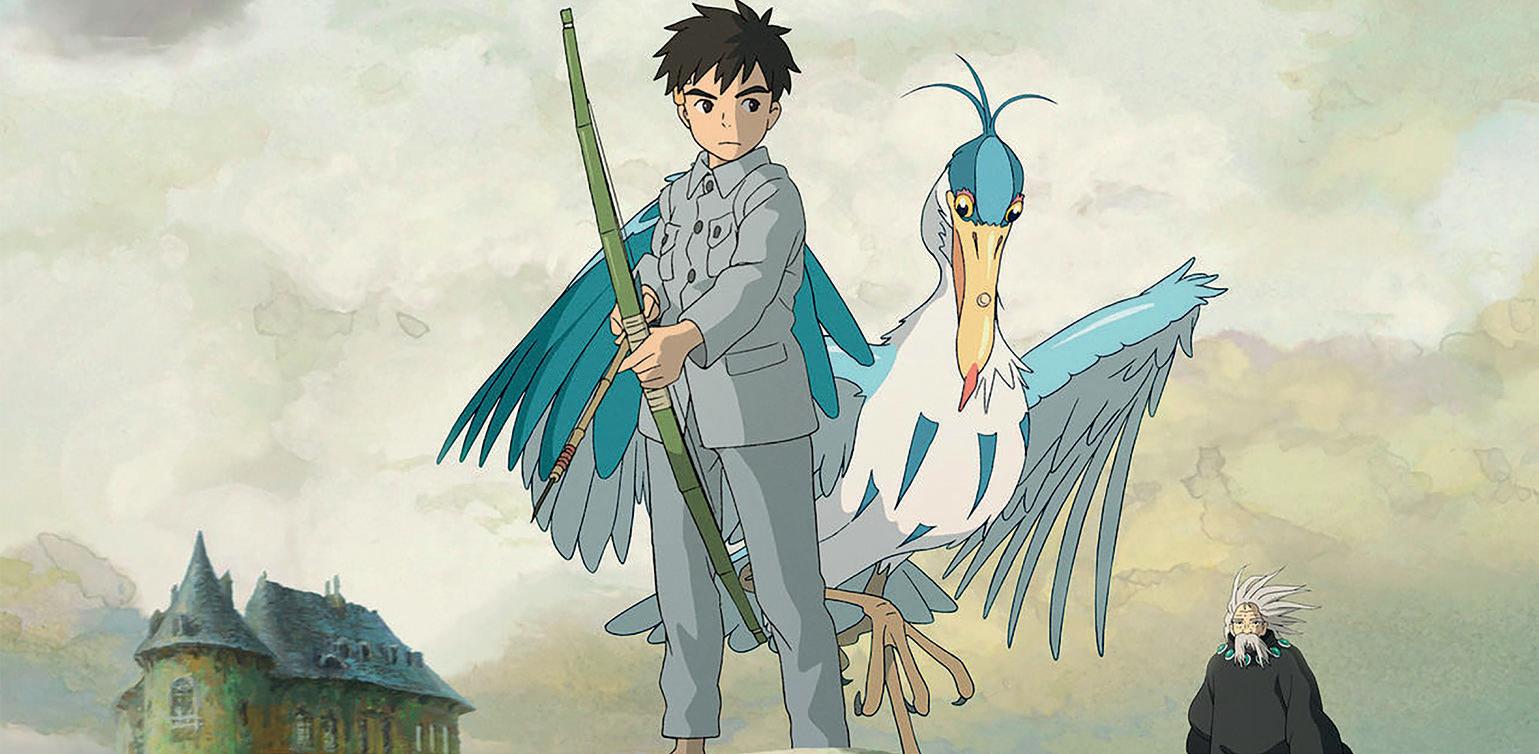

STELLAR reviews for Dune: Part 2 have been dotting the internet lately, and the seemingly endless promotion has seen the cast travel continents for red carpet premieres, while other bait for fans is being rolled out by cinemas themselves. As always, tabloid attention draws in the crowds by drumming up a romance between the two main actors, Timothée Chalamet and Zendaya — because of course if two people kiss on screen it means they’re dating! Otherwise, the main focus has been the dazzling
red carpet looks: a whimsical sci-fi theme of dress works perfectly to create the atmosphere of the upcoming film, while also replacing the boring old tux trend with something a little more exciting. To bring it all a little closer to home, though, fans will be supplied with a popcorn bucket in the shape of a gaping sandworm, and if that doesn’t make you flock to the cinemas, I don’t know what will!
Emily Sara Rizzo, Screen EditorIAM a complete sucker for British comedy, and there truly is no better light-hearted relief when deadline season comes around than going onto BBC iPlayer or whatever Channel 4’s streaming service calls itself nowadays (I’m still on 4oD) and finding some comedy gold.
No BBC comic creation has caught global attention in recent years quite like Philomena Cunk, who last year went viral on TikTok with clips from her 2022 series, Cunk on Earth. This was her second such historical mockumentary, following 2018’s Cunk on Britain Her bumbling, idiotic persona makes these series an easy watch, with a veil of being remotely educational.
The Cunk character is played by comic actress Diane Morgan, and created by eminent satirist Charlie Brooker. She first appeared in Brooker’s Weekly Wipe in the 2010s, alongside fellow dunce Barry S***peas, with Cunk playing the now well-worn role of dim-witted interviewer.

AThis is a role she reprises in both of her titular series, subjecting the likes of Robert Peston and Martin Kemp to the most excrutiatingly stupid questions, including asking a historian, “King Arthur came a lot, didn’t he?”
Although this is easy-to-watch comedy, it also carries political undertones. For example, one episode of Cunk on Earth , she sarcastically states, “They don’t have racism in America anymore. When they voted for Obama they sorted all that out.” Similarly, her social observations will make you stop and think (before realising how stupid the statement was) — after all, how many of us have asked, “If love is blind, how does it know it’s love?”
Last month, the BBC delighted us all with the news that Morgan will be reprising her role as Cunk in a new special later this year, in Cunk’s Quest for Meaning — as she ponders the meaning of life. For now, with deadlines piling up, treat yourself to her takes on British and global history.
S awards season fever rises each weekend, there’s still one film outside the weepy speeches and self-congratulations receiving media attention: Madame Web . Maybe February has become a cursed month for Marvel films after the panning of Ant Man and the Wasp: Quantumania this time last year, or maybe there is credence to the accusations of misogyny in the film’s terrible reception. Let’s follow the threads.
There is something that can be said for critics and audiences disliking films in franchises or genres usually kept as a male domain. There have been ruthless attacks on female remakes such as the 2016 Ghostbusters or Oceans 8, as well as rampant infighting over Captain Marvel and its November sequel
The Marvels , with the latter becoming one of the worst performing Marvel films of all time. Madame Web seems to fit with this trend.

THERE HAVE BEEN RUTHLESS ATTACKS ON FEMALE REMAKES... MADAME WEB SEEMS TO FIT WITH THIS TREND
Now let me first admit that although I enjoyed it immensely and feel it will probably become a camp classic in about a decade, it’s not particularly good. The acting, dialogue and overarching narrative are all weak, and that’s before you realise the reason you’re leaving the cinema thirsty is because you’ve just consumed a one hour fifty Pepsi ad.
Moreover, from interviews with star Dakota Johnson, it is clear she was sold a very different film to the one that she’s not bothered to see and has since fired her representation over. And in the ever-expanding superhero universe, she, like the rest of the cast, will probably get another chance at a better piece of media, perhaps some years down the line. Maybe they can even mock it like Deadpool’ s Ryan Reynolds.

SHE WAS SOLD A VERY DIFFERENT FILM TO THE ONE SHE’S NOT BOTHERED TO SEE
And yet. The vehement criticism
doesn’t feel completely earned, and neither does the poor box office performance. So, as it slips out of cinemas, if you have a spare afternoon, maybe go see it. It might just catch you in its web (forgive me).
Image: Pexels

THIS
ARTICLE CONTAINS CONTENT RELATING TO SEXUAL EXPLOITATION AND RAPE WHICH SOME READERS MAY FIND DISTRESSING
ONCE released into the world, artificial intelligence will be unstoppable. That’s what the science fiction films have preached for years. In some ways these prophetic pieces were right, just not with robotic McDonalds workers and people being killed by their Alexas. With all the many things AI could contribute, there's always a portion of society who find a way to exploit new technologies for their sexual pleasure. For AI, people have churned out pornographic fakes of politicians, celebrities and Only Fans workers, sometimes with, but often without, their consent.
Anyone who engages with popular culture knows the score: AI is an ethically grey area. It’s incredible how much money people will pay to see AI-generated nudes, now almost indistinguishable from photographs.
The automatic response is "great, we’ve fixed the exploitation of sex workers" but, that closed perspective of sex work as purely "exploitative" neglects the reality that sex work has and always will exist. The rise of Only Fans had allowed fetish content crea -
tors to work from their own homes, rather than in dangerous conditions. Is it better for influencers to be in control of the artificial versions of themselves, and the level

CLOSED
PERSPECTIVE OF SEX WORK AS PURELY EXPLOITATIVE NEGLECTS THE REALITY THAT IT HAS AND ALWAYS WILL EXIST
of consent their bots are willing to accept, in comparison to other forms of sex work?
I’m certain the extent to which these companies and individuals are attempting to justify how 'ethically beneficial' their business is, means that it is anything but. AI has been released into the world and when placed in the wrong hands it can do grievous harm. There are already some cases of children making fake nudes for revenge in schools, and of people making deepfakes of celebrities such as Taylor Swift.
We are living in a time of pride in terms of body image. AI porn’s focus on perfect bodies for a mostly male audience subverts the progress made to push self-love and self-confidence away from the patriarchal,
masculine gaze. There is also some concern regarding the way these bodies will inevitably come to degrade some body types, genders and races.
This brings us to the next area of concern: consent. If some chatbots allow deeply grotesque and explicit exercises of rape-like sexual encounters, how can we justify its presence? It might not be sexy to think about ethics, but it’s important we don’t throw morality away for the sake of pleasure. There will always be sick people on the internet, just consider whether you want to be a part of that group.
Image: ,dyonix01,
Deviantart

SINCE the early 2000s, the consolegaming world has been decidedly split between Microsoft and Sony, otherwise known as Xbox and PlayStation. The two companies have long rivalled each other in public opinion, although, this phenomenon seems to be dying down.
Consoles for home gaming were invented in the 1970s, with the launch of the Magnavox Odyssey in 1972. It was quickly followed by the Atari, the two systems quickly becoming the first rivalry within the niche industry. This success led to a ‘gold rush’ in the home console industry, with Nintendo, Mattel, and Colecon all launching products. Nintendo managed to get ahead, with their Nintendo Entertainment System (NES), introduced in 1985. The NES entered the very first ‘console war’ with the Sega Genesis. Sega and Nintendo competed intensely during the 1990s, with Nintendo eventually reigning supreme. Until, of course, Sony and Microsoft entered the market. In the twenty-first century, PlayStation and Xbox have been competing fiercely. The PlayStation 2 competed with the original Xbox, the PlayStation 3 with the Xbox 360, the PlayStation 4 with the Xbox One, and the PlayStation 5 with the Series X. Common differentiations are the controller design, the appearance and accessibility of the system, and the different games that each console provides.
For a while now, both companies have been buying out new releases or game studios and making the games exclusive to either PlayStation or Xbox. This is a tactic aimed at converting gaming fans to move from the rival company to the other option. When Sony announced the 2019 Marvel’s Spider-Man game to be an exclusive, I bought a PlayStation 4 to solely play it, falling victim to Sony’s tactic.
This tactic furthered the ‘console war’ between the two companies, which had once only been about appearance, or controller design. However, this seems to be changing. Microsoft has recently announced that four Xbox exclusive games, which have carefully remained unnamed, will be released to alternative platforms for the first time. Boss Phil Spencer claimed, “I do have a fundamental

belief that over the next five or 10 years, exclusive games, the games that are exclusive to one piece of hardware, are going to be a smaller and smaller part of the game industry.” Sony seems to be following suit, with Hiroki Totoki, Sony’s interim gaming president, announcing he wants to allow more PlayStation games to be released on other platforms.
Many believed Microsoft were going to announce a major change to their gaming platform, as Xbox president Sarah Bond had teased some new hardware, while speaking on a podcast, “the largest technical leap you will have ever seen in a hardware generation.” No further information has been released, leaving fans to guess. With how far consoles have developed in the past 10 years, especially with the success of Nintendo’s Switch, it will be interesting to see if Sony and Microsoft consoles begin to differentiate or homogenise, so much so that they become incomparable.

OPENAI, the creator of ChatGPT, has recently unveiled its newest technology that can create realistic videos from a user’s text instructions. Named Sora, the model can generate videos up to a minute long that include multiple characters, background details, and motion, all specific to the prompt. It also has the ability to understand and interpret complex language used in the prompts to create content that is virtually indistinguishable from real life. Whilst this development is incredibly impressive and opens up exciting possibilities for users to create videos using AI, it comes with potential dangers to the public regarding safety concerns and protection.

The Sora page on OpenAI’s website features many AI-generated videos accompanied by their prompts. We see Sora’s huge range, from the realistic to the obscure; "a drone view of waves crashing against the rugged cliffs along Big Sur’s Garay Point beach", to "New York city submerged like Atlantis. Fish, whales, sea turtles and sharks swim through the streets of New York." Sora can also generate animations similar to what we see in kid’s movies today, such as "an adorable happy otter confidently [standing] on a surfboard wearing a yellow lifejacket, riding along turquoise waters, [in a] 3D digital render art style."
The rate at which AI is developing is quick. If you look at AI-generated videos from a year or two ago, they hugely struggled to get features such as faces and hands accurate. Yet today, rapid continuous development means AI has progressed to generate videos simulating real life.
Scams and targeted phishing attacks have
the possibility to become more sophisticated and complex. Deepfake technology would be more accessible to make fraudulent scams seem believable and legitimate. We’ve already witnessed this with the deepfake video of Martin Lewis, a money-saving expert who is well known for giving tips and tricks to make money


and save money. His face and voice were AIgenerated to endorse a fraudulent app, aiming to scam his trusting followers. With Sora, there is the ability to create false information and twisted realities which could easily be used to deceive, most dangerously to skew public opinion such as influencing politics and elections. Who owns computer-generated work is one question raised alongside these developments. Authors of artistic, musical, and literary works own their creations, but AI is not a person so it cannot legally own the content it creates. But then, who is the owner? The creator behind the AI technology? Or the user who instructs the AI to create a video? According to the 1988 Copyright Designs Act, the author is classified as the person who undertook the arrangements necessary for the creation of the work — but it is still greatly up for discussion who the author of AI-generated work actually is. Copyright is much about incentivising people to create by being able to protect their work — if AI can generate art to the same level, or even a superior one, what is the point of trying to compete with that? Sora has unfortunately shown that whatever we humans can do, AI is another step in the direction of surpassing us.
OpenAI has acknowledged the safety precautions they should take before making Sora available publicly. This includes having tools to detect misleading information, a text classifier to check and reject extremely violent, sexual, hateful or celebrity likeness prompts and image classifiers to review the generated video before it is displayed to the user.
The question that remains is whether the release of Sora is an advantage for video creation, or if it leads us down a slippery slope full of misinformation and deception.
SMARTPHONE Free Childhood, the campaign started by parents and friends Clare Fernyhough and Daisy Greenwell, compares children’s growing reliance on smartphones to the once unknown dangers of smoking a cigarette.

‘Just as we marvel at the fact cigarette companies used to market their products as healthy, people will look back on this era and ask why children weren’t protected from smartphones’.
Potentially, smartphones have not been

around long enough for their impacts on young, developing brains to really be understood, and this is a growing concern for parents. The two mothers from Woodbridge decided to raise the issue through the creation of a WhatsApp group in support of those wanting to ‘hold off on buying their kids smartphones’, and encouraged parents across the UK to set up their own regional group chats. The movement has been discussed on several radio and television shows and has amassed a great amount of support. Ultimately, Smartphone Free Childhood believes children under the age of 14 should not own a smartphone, and children under 16 shouldn't have access to social media.

The campaigners' main concerns are that smartphones are highly addictive, correlate to mental health problems, expose children to harmful online content and reduce attention spans. These points are set out on their website, with relevant links to recent studies carried out in the US and UK on the correlation between smart-
phone use and its various impacts on the brain.
According to these studies, ‘greater social media use related to online harassment, poor sleep, low self-esteem and poor body image’, in turn relating to higher depressive symptom scores, ’with ‘teens that spent five or more hours on their phones 31 per cent more likely to be dissatisfied with their body weight’, according to a 2018 study in The Lancet. Smartphones are additionally proven to ‘normalise and increase self-harm and suicidal tendencies amongst adolescents, cause chronic sleep deprivation and negatively affect cognitive control, academic performance and socioemotional functioning’.
Not only are smartphones proven to be negatively affecting teens, but the ‘number of those using them has roughly doubled since 2014-15’.
Smartphone Free Childhood states that ‘tech companies are spending millions on making apps and devices intentionally addictive’, and they intend to ‘put pressure on these companies and the government to help us protect our children’.
Reducing smartphone use in our constantly expanding technological world would no-doubt be difficult, but perhaps limiting screen time and encouraging children to play outside could be the first crucial step towards improving the mental health of young people.

Question 1: What are good birthday presents for university students?
THERE comes a time in every students’ time at university where all of their friends seem to have birthdays at the same time. Then the classic dilemma arises: what am I supposed to get these people as a gift? The clear anwer would probably to get your friends alcohol for thier birthday. Most students obviously would appreciate alcohol on their birthday. One suggestion would probably be to get flowers for someone or even chocolates. Another cool present to get someone would be getting them tickets to an experience, something that they can then go and enjoy. You could also try to be more specific with the sort of present you get someone, such as getting them a niche present that is something they particualrly like or are interested in. Or another suggestion would be to collaborate and do a group joint present for someone so that you can all pitch in for the birthday presents. If in doubt there is always the WikiHow page on how to get someone a gift if you get stuck.
Question 2: How to deal with homesickness?
WHILE being at university is one of the greatest adventures, growing up is not a task that should be taken lightly. At most moments being at uni feels right, especially when our lives become so effortlessly busy. However, one minute we can be wishing the term would slow down and the next we are craving home comforts. As someone who across university years has very much fluctuated between the two, I thought I would share some tips on how to deal with feelings of homesickness. Above all, I’ve found communication is the best source of comfort. Using the walk home from campus to call someone is a great way to brighten your mood and when not at home a video call in particular gives greater comfort in hearing and seeing a loved one. While we cannot constantly be on our phones, make sure when you are missing home to look after yourself and give yourself things to look forward to (however this may look for you). Finally, try and do something you miss or perhaps something that reminds you of home. Though uni is a ‘home away from home’ we are often still drawn to the familiar —and this is entirely normal.


CAPRICORN (22 DEC — 19 JAN)
The desire to express yourself and share your experiences with others is powerful.

AQUARIUS (20 JAN — 18 FEB)
There is an increasing focus on developing your projects and plans, as well as income, means, and resources.

PISCES (19 FEB — 20 MAR)
You might feel more attractive from the inside out, sharing your personality and ideas more than usual.
WHAT’S hot, better when there’s alcohol, and cheesy? No, i’m not talking about Fever room 2, but this insane vodka pasta, this week’s recipe. Only taking about 20 minutes to make, and great for sharing with your flat, friends, or family, it’s the perfect boozy night in…
Step one:
Heat 2tbsp of olive oil in a frying pan, and add one diced small onion or shallot with a pinch of salt, then fry on a low heat for five minutes or until the onions are soft. Add two diced cloves of garlic and a tsp of chili flakes and fry for 30 seconds. Stir in

ARIES (21 MAR — 19 APR)
It can be a time to tie up loose ends, deal with endings, bring projects to a close, and catch up on rest.

TAURUS (20 APR — 20 MAY)
There can be a special project you’re working on that now advances.

GEMINI (21 MAY — 20 JUNE)
Whether it’s about your career, responsibilities, need for structure, or life path, it’s a time to perform.

CANCER (21 JUN — 22 JUL)
It’s a good time to brush up on skills, discover different topics, and gain practical experience.

LEO (23 JUL — 22 AUG)
This is a time for going in deep and enjoying what you do. Support and backing can be in focus.

VIRGO (23 AUG — 22 SEP)
Interesting developments with daily routines or on the job front have been a feature recently.
EDITORS:
Anabel Costa-Ferreira
Livvy Mason-Myhill
Joshua Smith

LIBRA (23 SEP — 22 OCT)
Even with romantic and creative excitement, you manage to get a whole lot of work done.

SCORPIO (23 OCT — 21 NOV)
A feeling that you’re in sync with the world around you can figure strongly.

SAGITTARIUS (22 NOV — 21 DEC)
You’re finding time to enjoy familiar and comforting activities as well as feeding your curiosity.
100g of tomato purée, then add 5tbsp vodka (any more will make the dish too sharp). Stir through 100ml of double cream, and take off the heat.
Step two: Cook the pasta al dente in salted water. Drain and set aside 150ml of the cooking water, add 50ml of this to the pasta sauce, and add 30g of parmesan or a vegan alternative.
Step three: Mix everything together over a low heat and season to taste with a bit more parmesan, black pepper, and basil leaves. Enjoy!

THE month of March begins, Comic Relief Day is fast approaching. An annual campaign created by Comic Relief, the day has been running since 1988, with the first year using the slogan “The Plain Red Nose” raising an impressive £15 million. The campaign itself raises money for child poverty across the globe to provide safety, support and education. Often schools and universities in the UK heavily involve themselves in the campaigning, Exeter included. Turning to a copy of Exeposé from March 2001, a Features article detailed the many events and ways to get involved with the campaign as an Exeter student. In 2001, celebrities ‘lined up to say ‘Pants to Poverty’ and Delia Smith wrote an exclusive chocolate cookbook for £1 with proceeds given entirely to charity.
Similarly Exeter alumnus J.K Rowling wrote two books for Red Nose Day titled ‘Fantastic beasts and where to find them’ as well as Quidditch through the ages.’ Again, priced affordably at £2.50, around £2 was estimated go directly to the charity. As well as a multitude of literary contributions, this year saw several sporting events run such as a ‘Big Red
Football Tour’ which made ’its way across the country with anyone being able to make a donation and join celebrities in signing the ball.’
However the article does urge that if ‘football is not your thing then there is a Red Nose Row’ also being hosted as many take on complex and impressive challenges to raise money.

The article then goes on to to remind students of how they can wear a red nose to support the cause. Drawing special attention to the Whoopee nose, created that year especially by Aardman (creators of Wallace and Gromit ) and featuring a ‘cute face with a blow out tongue.’ With this years’ Red Nose Day designated for Friday 15th March, keep an eye out to see what events the University will be running and how to get involved.


Across
1 Earth (5)
4 Drinking vessel (3)
6 Trivial lie (3)
8 Reasoned thought (5)
9 Self-inflicted disadvantage (3,4)
10 Rotate — spin (6)
11 Potato chip (5)
13 Season — fall (US) (6)
15 Puma (6)
18 See 16 Down
20 Nevertheless (6)
23 Male cockerel — toreros (anagram) (7)
24 Prince of Troy (Greek mythology) (5)
25 Fool (3)
26 Managed — sprinted — went (3)
Down
1 Healthy spring (4)
2 Warwickshire public school (5)
3 Make a rhetorical speech medical (anagram) (7)
4 Shut (6)
5 Lose one’s cool (5)
6 Foundation (of a business, say) (7)
7 Approximate (figures) (8)
12 Bouncy marsupial (8)
14 Period of absence (4,3)
16/18 Modern international event first held in 1896 (7,5)
17 Diacritical mark no marc? (anagram) (6)
19 (Indian) musical instrument (5)
21 Pungent (5)
22 Former Russian emperor (4)
27 Large tree — raced (anagram) (5) Across:

5.

1. What do the three leaves of a shamrock symbolise on St. Patrick’s Day?
2. How do leprechauns earn their gold?
3. Iceland diverted roads to avoid disturbing communities of what?
4. What was the first animal to ever be cloned?
5. Michael Flatley danced his way to fame in what Irish-inspired show?
6. On average, which grows faster: Fingernails or toenails?

SCIENCE EDITORS:
Eloise Shewring
Hannah Woodley
Charlie Gershinson
CLIMATE change is taking its toll on the weather, and how practices like agriculture must develop in order to adapt sustainably to current demand. Research is being conducted constantly in order to attempt to achieve net zero. CFO of Glass Pharms Olivier Dehon explores another approach to reducing carbon emissions: carbon-neutral cannabis.
Despite being colloquially referred to as “grass”, cannabis is not very green. According to the European Monitoring Center for Drugs and Drug Addiction, approximately 6,000 kWh of energy are used to cultivate 1 kg of the drug, amassing a carbon footprint of 1,400 kg. In layman’s terms, this means that the carbon footprint of a joint rolled with 1/3 gram of weed is interchangeable with driving a hybrid electric car

Approximately 6,000kWh of energy are used to cultivate 1kg of the drug
about three miles. In the Netherlands, about one billion kWh of energy were stolen for cannabis production.
The demand for medical marijuana following a law change in 2018 is increasing exponentially, with almost 24 tons of cannabis being imported to the UK in the first nine months of 2023, nearly three times the quantity imported in the whole of 2022, according to The Guardian. However, with all of the legal cannabis being imported from overseas, the supply falls short of the mark. This leaves a large market with a realm of possibility — enter Glass Pharms.
Discreetly situated in the Wiltshire countryside, this facility grows legal, medical, above-board cannabis, with one differentiating factor from other indoor weed cultivations: it’s carbon-neutral. Usually, between the LED lights shined onto the plants and air temperature regulations to ensure the successful growth of the product, this kind of structure would use a massive amount of energy.
Glass Pharms stays clear of using
any energy from the National Grid, sourcing their power and heat from a nearby anaerobic digestion plant. Head of external relations for Glass Pharms, Mark Heley, says, “What we’ve done here is we look at the fundamental problem, which is that if you’re growing plants indoors in the UK, in this climate, the factors that you’ve got to have are basically heat, power and, particularly in the case of cannabis, carbon dioxide.”
Heley further states, “Since the outputs from an anaerobic digestion plant is power and then, effectively, the waste heat… it produces carbon dioxide, we’ve got inputs to our system that are not only the outputs of the adjoining plant, they are waste products of the adjoining plant.” The operation runs on circular economic principles: all water used (for irrigation or otherwise) is rainwater, which gets recycled through a closed-loop system; and the air trapped inside the plant is recirculated, preserving heat and humidity without having to manipulate the temperature through
energy-consuming systems. Dehon says that they one day hope to feed their plants with the carbon dioxide emissions resulting from the methane biogas being burned by the glass structure. Glass Pharms drives an innovative approach for more energy-intensive kinds of horticulture to secure a place in the supply chain, especially considering that ongoing and forthcom-
ing climate fluctuations are bound to significantly change agriculture.

All water used is rainwater, which gets recycled through a closed loop system

claim not to drink on a regular basis.

OVER the last two decades, weekly alcohol consumption in adults has been maintained at 55-60 per cent in women and 70-75 per cent in men. In a scientific case study, there had been marked increases in men and women of drinking over the binge value (eight units in a day) and only 15 per cent of the adult population
Only 15 per cent of the adult population claiming not to drink on a regular basis
The relatively high volume of consumption contributes to a variety of alcoholrelated health issues that cause the presentation of some noticeable symptoms, which will be discussed.
One effect is heat loss from extremi -
ties: when the body is too hot, the arterioles that allow blood transport to the skin dilate. This causes more blood to be directed to the skin surface to release heat from the body and lower the body temperature.
However, even when the body temperature is low, drinking alcohol makes this dilation occur, to lower the temperature even more. Because of this, basic metabolic body functions have less heat to provide energy to be
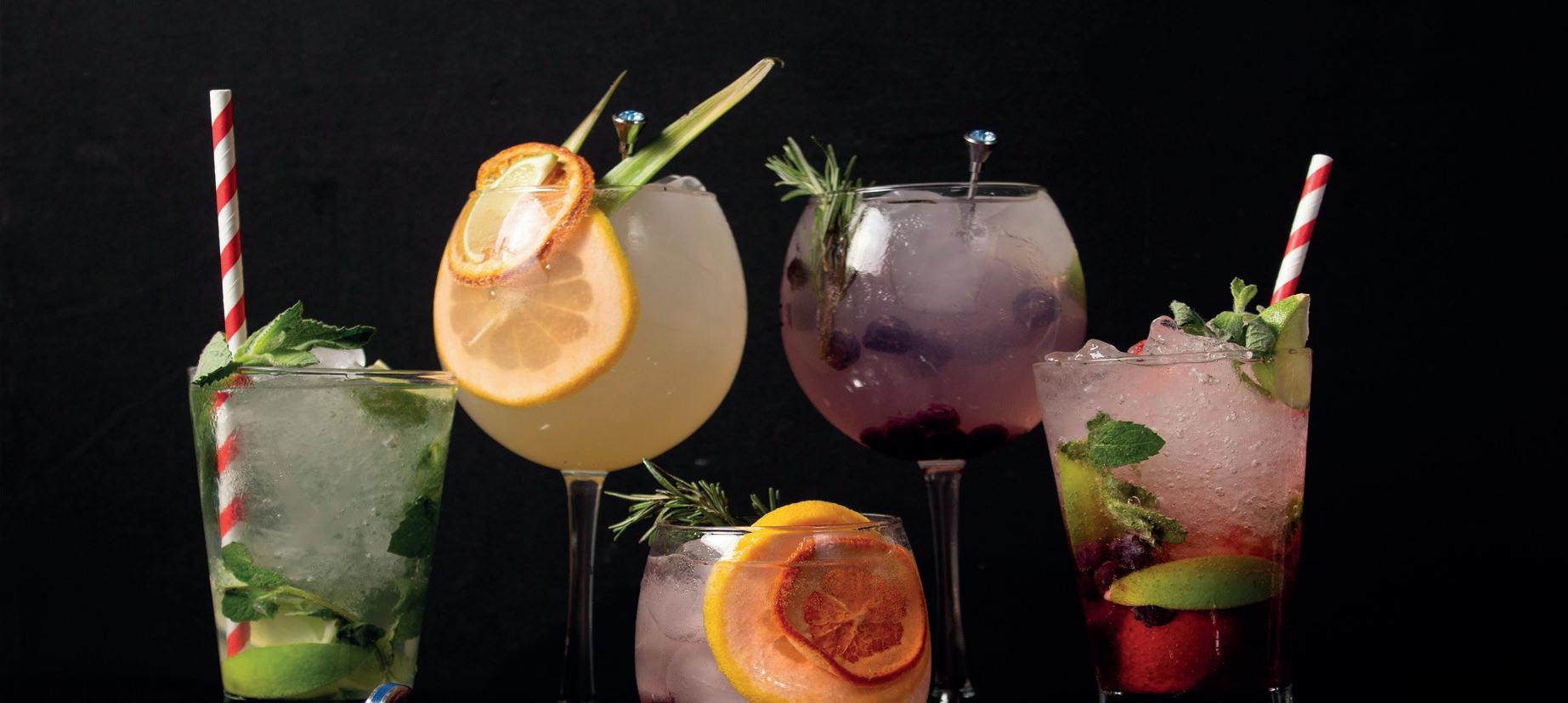
carried out. Continued alcohol consumption in this situation may lead to hypothermia, which can ultimately lead to unconsciousness/death due to body cells being unable to function. Vasodilation can be indicated by pain, ache or tightness across the chest when you physically exert yourself. Alcohol has been concluded to act “acutely as any other anaesthetic agent to abolish all regulatory control functions" (being poikilothermic), according to a 1981 paper written in the Brain Research Bulletin. What is described is generally only an issue in cold seasons where the body temperature is lower than normal, however at even higher levels of alcohol consumption, vasoconstriction can occur which leads to migraine headaches generally.
Furthermore, Alcohol Liver Disease (ALD) concluded as a major cause of Chronic Liver Disease, this condition can lead to cirrhosis (researched as the 12th highest cause of death) and alcoholic hepatitis, which together comprise the statistic that 48 per cent of deaths in 2007 were
alcohol-related. Alcohol consumption, along with body mass index, are strongly associated with liver disease mortality. Cirrhosis, a severe effect of ALD which results in delirium, is the damage of healthy hepatocytes, usually caused by alcohol, so the body can’t produce enough proteins or filter toxins out of the blood which is detrimental to health, developed by 10-20 per cent of excessive drinkers. Symptoms include jaundice and pruritus (skin itching) and women have been researched to be more at risk of developing this, due to the fact they have less enzymes which detoxify alcohol — which include alcohol dehydrogenase and aldehyde dehydrogenase. Alcoholic hepatitis, the inflammation of the liver caused by alcohol consumption over a longer period, produces symptoms such as: fluid accumulation in the abdomen, abdominal tenderness, fatigue, fever, nausea and vomiting. Diagnosis includes testing for leukocytosis (caused by inflammation of liver tissue), liver enzymes, and levels on magnesium, potassium and sodium ions.
IN a speech last week to the National Farmers Union, the largest farmer lobbying group in the country, Rishi Sunak announced a funding package to support the farming industry. The Prime Minister told the Conference that this package will include £220 million in support for tech-
nology and innovation, more than doubling a similar package offered to the farming industry last year. The grant is expected to focus on ensuring farmers have better equipment and moving towards further automating amongst the farming industry.
At the NFU annual conference at
Birmingham the Prime Minister also announced plans to “cut bureaucratic red tape around permitted development rights so farms can easily develop buildings and diversify earnings through farm shops, commercial space and sporting venues”. This innovation package will form

a part of the government’s £2.4 billion budget for the farming industry this financial year, which was a previous promise made by the government to commit to £2.4 billion each year until the next election. As part of the farming budget, a £427 million grant to farmers have been pledged, the largest in history, with farmers who managed their farmland sustainably receiving double the grant in the sustainable farming incentive scheme.
The retiring NFU president, Minette Batters stated that the plans presented include “no actual new money”, but the plans by the Prime Minister were “effectively a new business plan for agriculture”. The NFU has been criticized by other groups such as farming enterprise Proud to Farm ahead of the conference for not “listening to (farmers) concerns”, and that the government had already “lost the trust of the farming sector”, according to the BBC.
The conference comes days after farmers in protest blockade the Port of Dover, where a demonstration using tractors slowed down traffic around Dover to raise awareness about their unfair treatment and under-pricing from supermarkets. One farmer, Jeffrey Gibson, said that the supermarkets were selling British goods at prices “cheaper than the cost of
Oproduction”, highlighting the widespread concerns of farmers on cheap foreign foods were undercutting the British farming industry. “We produce crops to the highest standards in the world, but have to compete with imported foods containing illegal chemicals and the government does trade deals with those countries,” he added.

The plans presented “no actual new money”... “new business plan”
Liz Webster, a former Liberal Democrat candidate and founder of Save British Farming, a pro-EU farming group, said: “Successive governments have given too much control to the supermarkets, who’ve been in a price war with each other, and it’s just been a drive to make everything cheap — as cheap as possible”.
Whilst farmers have historically been one of the most supportive groups of the Conservative Party, it would be fair to say that the industry is not entirely reassured by the government’s attempts to remedy the situation. Many believe the situation is at breaking point, with farmers wanting much more substantial solutions in the form of protectionist policies towards British Farming against undercutting foreign goods.
N 9th June 2023, a blowout occurred at a remote natural gas drilling well in the Mangistau Region, southwestern Kazakhstan. During the next six months, 127,000 tonnes of methane burned, and the fire was only extinguished and brought under control on 25th December. The site is now being sealed with concrete. This is arguably the second worst man-made methane leak ever recorded, second only to the Nord Stream Pipeline explosion in 2022. According to the US Environmental Protection Agency’s Green-
house Gas Equivalencies Calculator, the amount of methane that escaped is equivalent to driving more than 717,000 petrol cars for over a year. The leak was first investigated by the French geoanalysis firm Kyrros, who used satellites to track its progress. Whilst methane is invisible to the human eye, once sunlight passes through it, it becomes visible to some satellite technology. Although this imagery is not perfect, and can be disrupted by things such as cloud cover, the scientists at the firm say they are “completely sure” that large amounts of
methane gas escaped. It was through this satellite imagery that the figure of 127,000 tonnes was calculated.

Their findings were confirmed by the Netherlands Institute for Space Research and the Polytechnic University of Valencia, in Spain. Mr Gaunter, from the Polytechnic University of Valencia, explained that they had man-
aged to obtain results from five different satellite instruments, and they had all returned consistent results. Further joint analysis by the institutions found that on 115 separate occasions between June and December, high levels of methane had been visible. The company responsible for drilling the well, Buzachi Neft, has denied that any large-scale leak occurred, instead suggesting it was water vapour that the satellites had picked up. However, the Department of Ecology in the Mangistau region said that “excessive amounts of methane in the air”

had been recorded between June and December. National authorities have ruled that violations of environmental legislation had taken place and have provisionally fined the company 350 million tenge (£614,000). On top of the fine, the company have been told that they must come up with a “remediation programme” to deal with the environmental impact. An investigation found that the company had not properly supervised the drill, and also placed the blame on Zaman Energo, a subcontractor, for numerous failures during the drilling process.
As of the beginning of 2024, the leak appears to have stopped, and the Department of Ecology in the Mangistau Region said that during a surprise inspection in January, no more gas had been detected in the air, although pollutants in the soil remained. Similarly, the Polytechnic University of Valencia said that their satellite imagery showed that the leak had ceased.

Although pollutants in the soil remained
Kazakhstan is a signatory to the Global Methane Pledge, an agreement to slash methane emissions by 30 per cent by 2030. Despite methane’s devastating environmental impact, it is also short-lived in the atmosphere, so achieving significant reductions in emissions would have a rapid effect in helping the climate crisis.
Oliver Lamb, News Editor, sits down with Exeter student and professional cricketer
THIS time last year,” John Turner says, “this wasn’t really on my radar, I was a normal uni student.” Almost normal, anyway — he was already a professional cricketer, a fast bowler for Hampshire. But since then he’s been picked in two England squads, trained with the second-string England Lions, and played franchise cricket in England and South Africa. Only now is it sinking in.
Turner lived in South Africa until 2021 but has a British passport through his mother. He is a final-year Economics and Finance student at Exeter. On the 14th August last year he played his first — and so far only — game for the Trent Rockets in the Hundred, England’s short-format franchise competition. That was his 30th professional match across all three formats. He knew his career had started well, but an England call-up? “It’s the stuff you dream about,” he remembers thinking, “it’s not actually ever going to happen.”
The next day he was picked for that summer’s T20 series against New Zealand. England’s current management picks players for their raw materials as much as for their domestic record, and they liked Turner’s rare combination of pace, bounce and accuracy. “I was shocked, didn’t know what to say, phoned my parents and they were probably more shocked than I was,” he says. But the phone call came when he was in hospital for a scan on his side. The injury ruled him out of the series. “I had probably the best day and the thing you dream of all the time happening, and the next day it was just taken from me. So that was tough, and that took a long time to come to terms with.”
It’s a dream he has nursed since the age of six, when he and a couple of friends started playing several times a week. “I’ve got a very competitive nature and mindset, so if I’m doing something I’ll want to be the best at it,” he says. But enjoyment was what drew him to cricket, and his attitude to the game and to life remains balanced. “When you stop playing for the fun of it, that’s when you won’t be as successful,” he says. “I’ve always said to myself, if it ever does start feeling like
a job, or I’m not enjoying it, or I’m not being successful, then I’ve got my degree and I’ll go get what everyone perceives as a normal job.” One way or another, he sees himself ending up in finance.

I've got a very competitive nature and mindset
His parents were keen for his education to come first, and the desire to play cricket professionally always came from himself. “I was fortunate to go to a very good sporting school [Hilton College], and you would see some parents really pushing their children,” he says. “I’ve never felt pressure from my parents to pursue sport. If anything I’ve probably felt a bit more pressure from my mum to pursue a normal career.”
Believing that the UK was the best place for him to balance sport and studying, he visited Hampshire for two weeks in 2018, and returned permanently three years later. Midway through the 2021 season came his first Hampshire contract.
After the false start to his England career, he did not have to wait long for another call-up, this time for the December 2023 white-ball tour of the West Indies. Before that, in November, he spent 10 days in Abu Dhabi with the Lions. Turner was one of many talented rookies in a camp that was geared towards player development. “It was all just preparation for subcontinent cricket — emphasis on the spin, reverse swing for fast bowlers,” he says. “I really enjoyed it. We had [former England all-rounder] Freddie Flintoff with us for a bit, and [former England spinner] Graeme Swann, so being able to learn off them was quite cool.”
Straight from Abu Dhabi, Turner flew to the West Indies to join the ODI and T20 squads. “My first night in the Caribbean, we were all sat around having beers,” he says. “I was like, ‘How on earth am I having beers with all of these guys?’ Six months ago, never in my wildest dreams did I think this was going to be happening. So, I think initially I had a
bit of imposter syndrome, but it was an unbelievable experience, and at the end of the day they’re just normal guys that are playing cricket, similar to myself, so once you get past that initial surreal part of it, it’s just back to your everyday job.”
England lost the ODI series 2-1, and the T20 series 3-2. Turner did not make a début. “I thought there would be one or two or three games, so I was a bit disappointed,” he says. “But it’ll leave me in a much better place for if I get that opportunity again.”
His university work came with him on tour. Reasoning that he’d only be kicking the can down the road, he never looked into ways to ease his workload. “It’s been interesting juggling it, it’s been tough. The University have helped, though, so I’ve got extensions when I’ve needed extensions, and the cricket department, head of cricket and director of sport, they were helping as much as they can,” he says. “The competitive side of me thinks I can still do really well, so it’s a good challenge to have, but I am looking forward to finishing, to be able to just focus on something.”

It's been interesting juggling it, it's been tough
What’s been hardest, though — and not just on tour — is the separation from his university friends. “My mates, in the summer, go travelling, go all over Europe, do what they want to do when they want to do it, whereas that’s our season,” he says. “I think that’s the only time I really feel like this is a job.”
As difficult as it has been to balance university and cricket, the former helps the latter. “It gives me a distraction away from the game, it gives me a social network away from the game, and it means when I am training, when I’m playing, I’m in the gym, whatever, it’s really specific and I’m really putting 100 per cent effort into it.”
Turner might have spent January and February in India with the England Lions, playing red-ball matches against India A. Instead, he put himself forward to play for

Paarl Royals in the SA20, South Africa’s franchise T20 competition. He felt at ease right away. “It’s actually a great life during the comp,” he says. “Late breakfast, a lot of golf, a lot of padel, then a gym session at some point, either a match in the evening or training in the evening, and then do it all over again. So you end up having quite a lot of time to fill.” With university work? “Should have done more than I did.”
Against Eastern Cape on the 4th February, Turner played his only match of the winter, taking a respectable 0/30 from four overs in a defeat. Paarl Royals eventually lost in the playoffs. “I would have liked to play more, I thought I should have played more,” he says.
Still, he doesn’t regret his decision to choose the Royals over the Lions. “Red-ball cricket and Test cricket is still the priority and the dream, but you also have to make a living out of it and that’s where white-ball cricket is,” he says. But it wasn’t just a financial move. “What I learned from the SA20 will put me in a better place going forward for the next year or two, than necessarily what the Lions tour would have given me.”
So what has he learned this winter?
“Situations, how you deal with them, and different experiences, different pressures, different people, the way those people go about their work, how they train, how they recover, how they talk about the game and see the game,” he says. “I’m probably a lot more confident with my cricket at the moment.” He tried
Wto learn as much as he could from everyone. “Lungi Ngidi, he has an unbelievable slower ball and uses that really well,” he says, by way of example. “Sam Curran, great yorker, didn’t nail it all the time, but still had the confidence to go back to it.”
On the road, Turner remained involved as much as he could with the University of Exeter Cricket Club, where he is part of the leadership group. “I’m there if guys need help, advice, someone needs to talk about something,” he says.
Back in his days of almost-normality he played a handful of games for the Club, including against first-class counties during the county pre-season. “We played Gloucester in 2022, and we were on top for the majority of the game, same against Sussex last year, so I think when we play against those teams it brings out the best of us,” he says, modestly forgetting that he took nine wickets in the two matches. His hopes of playing again this year have been scotched by a knee injury.
The 2024 English season begins on the 5th April. “I’m not really a massive goal-setter,” he says. Other than playing more red-ball cricket, he just wants to build on the last 12 months.
More international opportunities will come: in October, England awarded him a development contract that means they pay him a salary in exchange for some control over his workload. A Test début this year is unlikely, but possible. “I’d love to make my début this season,” Turner says, “but I think that’s thinking a bit too far ahead.”
ith relegation scraps, battles for European spots and a three-way title race, the conclusion to this season’s Fantasy Premier League (FPL) campaign is set to be very exciting. Now is a pivotal moment for managers to gamble in the hope of climbing up their mini leagues and increasing their overall rank. But who are the players that will guarantee points? Do we choose form or fixtures? And is Erling Haaland essential?
Let’s start with the defence, with players such as Udogie, Porro, Myko -
lenko and Gabriel all providing great value for money. Trippier is slightly more expensive but is the highest scoring defender this year so make of that what you will. The goalkeeper decision is also a crucial one. It might seem obvious to pick someone of a better team as they should concede less, yet players like Ederson and Alisson are too expensive in a position where it is easy to save lots of money. I recommend Pickford, Martinez or Areola for save bonuses.
The midfield has to contain Salah, that is a given. The England pair-
ing of Saka and Foden are also pretty much essential. This leaves two spots free. Some may choose Son given his massive points return so far, but I would opt for a cheaper duo in order to free up funds for the forward line. Douglas Luiz is a gamble but is involved in everything good with Aston Villa at the moment, and Gordon and Palmer are also great picks. The real underrated hero has to be Gross though, who is remarkably the league’s top assister so far this season. This leaves the forwards. Haaland
is now back and (somewhat) scoring, and with Man City’s title run-in record, I think he has to be owned. Managers may prefer to share the money across their strikers though, with Nunez and Hojlund also being good options. Solanke is the unsung hero here, and for his price, he is an incredible option for the amount of points he is producing. However, maybe the best choice of all is remarkably the highest points scorer in FPL this season so far — Ollie Wat kins (I mean who saw that coming?!). I could have mentioned many
other fantastic options you
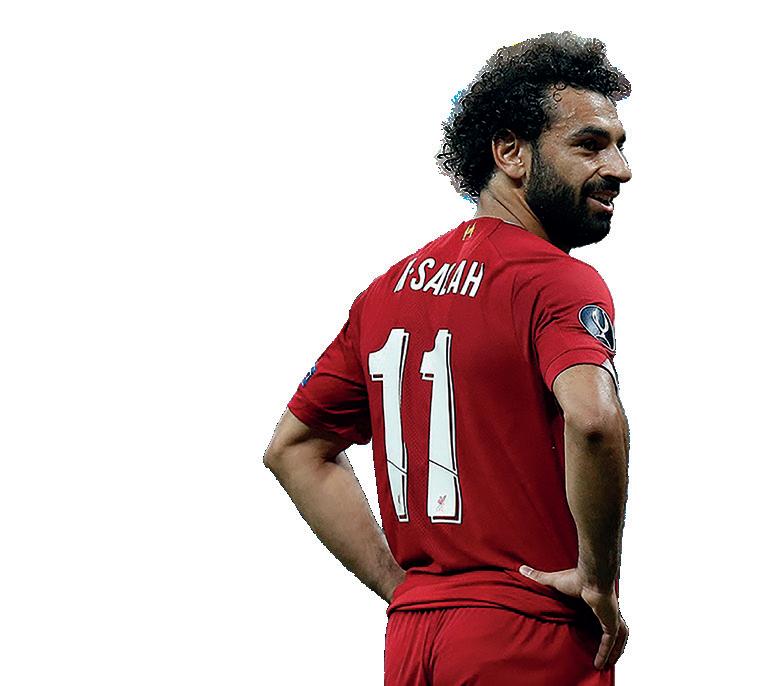
FTER four exciting, hardfought cricket matches, India led England 3-1, and have won the series with a match to spare.
It had all started so well for England, who won the first test match by 28 runs in what has been described as one of their all-time great wins.
Ollie Pope was imperious with the bat, scoring 196 runs in the second innings, before debutant spinner Tom Hartley took seven wickets to seal the victory, and create a strong sense of hope and belief going into the following test matches.
Ever since Ben Stokes took over from Joe Root as captain, working alongside coach Brendon McCul -
Tom Morris discusses the test series between India and England
lum, England have been playing a style of cricket known as ‘Bazball’. This involves batting fearlessly, and being brave with the ball and the field, prioritising the potential gains of a fierce style of play over any possible negative consequences.
England have had much success with this style of play, winning lots of test matches and always exciting and engaging the crowds even in defeat. After drawing the Ashes series with Australia last summer, meaning Australia retained the Ashes, praise was still heaped on Ben Stokes’ entertaining team. In many ways, England have helped revolutionise Test cricket, a format that many say is dy-
ing, being replaced by the faster 20 over format played in the rich and successful Indian Premier League.
But winning on Indian soil is never easy. Unphased by the thrills of the first test, the home side showed their class, winning the next two tests by 106 runs and 434 runs respectively. The latter included a capitulation by England, being bowled out for 122 runs trying to chase down 557. This was their biggest defeat in terms of runs since 1934.
And the series was decided in the fourth test as the tourists, who had a 46-run lead after the first innings, again performed poorly in the second innings, being bowled out for 145 and leading to a five wicket win for India. There will be disappointment in the England camp, but there will be positives to take forward after the fifth and final test that starts on Thursday 7th March. England’s young spinners, Tom Hartley and Shoaib Bashir, performed admirably, being asked to bowl over after over in tough conditions.

And the classy batting performances of previous captain Joe Root and vice-captain Ollie Pope show England’s quality.

Former England captain and cricket commentator Nasser Hussain said ''there is no shame in losing to this Indian side'' but recognised that England’s decision making and performance in key moments could have made a difference in the ultimate result.
‘Bazball’ as a concept is still quite young, and although it produces exciting cricket, will need some developing to give England the best chance of winning each match they play. Having got out trying to play an audacious scoop shot earlier in the series, Joe Root earned his unbeaten cen -
tury in the fourth test by playing a more measured style of play. He was patient and sensible, taking more singles and pouncing on poor deliveries. If England can combine these attributes with their expansive style, they could be on to a winning formula.
After the final test in India, the team will return to England and start preparing for the home tests that the summer will bring, including matches against West Indies and Sri Lanka, where there is sure to be more gripping matches that will thrill the English support.
Lauren Walsh, Arts and Lit Editor, recounts Super Bowl LVIII between the Kansas City Chiefs and San Fransisco 49ers
THE Super Bowl serves as the final game in the American NFL (National Football League) season, and this year, ‘Superbowl 58’ took place on Sunday the 11th of February, at Allegiant Stadium in Las Vegas Nevada – the first time

it has ever been held in this city. The game this year saw reigning champions Kansas City Chiefs take on the San Fransisco 49ers, in a rematch from the Super Bowl four years ago. The Chiefs won 25-22 against the 49ers in overtime, making it the longest Super Bowl game in history and only the second to ever go into overtime, with wide receiver Mecole Hardman scoring the winning touchdown. The Chief’s quarterback Patrick Mahomes became the Super Bowl MVP for the third time, after completing 34 of 46 pass attempts, with two touchdowns and one interception. This is also the Chief’s third Super Bowl win in five years, leading to some saying this victory establishes their dynasty.
However, the Super Bowl, being such a patriotic American tradition, is not only about the football but about the spectacle. It is one of the world’s most watched single sporting events, and the extremely high viewership contributes to companies spending extortionate amounts of adverts during the event. The Super Bowl adverts, in addition to the halftime shows, are as much a part of the Super Bowl experi-
ence as the game itself. For example, this year the adverts included trailers for upcoming films such as Wicked and Kingdom of the Planet of the Apes and even Beyoncé teasing the release of her new album on March 29th in addition to releasing two songs from said album. R&B singer Usher headlined the half-time show, with surprise appearances from many other artists such as Alicia Keys and Will.i.am.
In other cultural phenomena news, an estimated 20 per cent of viewers watched the Super Bowl because of Taylor Swift, and her relationship with the Chief’s tight end Travis Kelce, according to the BBC. Swift first attended one of Kelce’s games back in September and has since contributed a lot to the brand value of the Chiefs, as well as the NFL itself, in what is being called by many ‘The Taylor Swift effect’. Swift, who is currently performing in her global record-breaking Eras Tour — and flew over from Tokyo on her private jet in order to watch her boyfriend play — was featured on camera 12 times during the match, in airtime worth about $12.4 million or £9.7 million (based on the cost of adverts dur-

ing the Super Bowl). Superbowl LVIII had the highest viewership in Super Bowl history, and it is assumed that the Taylor Swift effect played a role in this.
Unfortunately, the Chief’s celebrations on the 14th February in Kansas City, Missouri, were overshadowed by tragedy when a shooting after the victory parade resulted in one death and 22 injuries. Nine of those injured were children, the youngest of whom was only eight years old. Two men, Dominic Miller and Lyn-
dell Mays, have since been charged with second-degree murder and other gun-related counts. Both Travis Kelce and Taylor Swift donated $100,000 each to surviving victims and their families, and Patrick Mahomes and his wife visited some of the survivors.
So, from establishing the Kansas City Chief’s sporting dynasty, to record-breaking viewership, to Taylor Swift, to a tragic shooting, this year’s Super Bowl and its cultural impact are not likely to be forgotten any time soon.

‘Mini Mad Max’ (Maximus Baxter-Fox), who won the men’s skiing competition.
ALTHOUGH February was unseasonably mild, Snowsports still found a way to bring a small slice of the Alps to Exeter on the 17th February, as Chill Hill returned to campus for the first time since 2017.
This was a project of epic proportions. 50 tonnes of snow were shipped in from Milton Keynes to create a ski slope down Forum Hill, and thousands of students flocked to campus on a Saturday for an après-ski festival atmosphere.
The spotlight event was on the freestyle competition, featuring competitors from six universities on skis and snowboards for five awards. The slope was converted into a mini Slopestyle course, comprising a rail feature followed by a jump.
On the women’s side, Jenna Brennan won the women’s skiing competition. For those who preferred to strap into a snowboard, rather than two skis, Dorset’s Mason King won best snowboarder. There were also two other less serious categories, for Best Outfit (won by Jamie) and Most Falls (won by Ross).
Snowsports’ Race Captain Max Fairfull told Exeposé that, despite not competing at the event, he “can safely speak for all the racers at the event that we had the most amazing time.” He went on to say that he “couldn’t be prouder of our freestyling counterparts, with a shoutout to Oli’s knees because f*** knows how the man is still walking.”

As the sun set over Forum Hill, the finals began, despite the gentle drizzle that began to fall that the spectators all wished was snow instead. The tricks got gradually bigger (and more dangerous!) as the competition progressed, and although plenty ended up on their backsides, with skis flying off or even with a bloody nose, there were some impressive efforts, including from local 11-year-old
Away from the purely competitive efforts, the finals were preceded by a two-hour freestyle jam to showcase some of the competitors’ biggest and best tricks. Meanwhile, the day began with an adaptive skiing exhibition, opening up the day’s events to local disabled skiers, who took to the slopes on sit-skis.
This was an important reminder that the event was fundraising for Disability Snowsports UK, a charity which aims to provide opportunities in skiing and snowboarding for people with disabilities. As
accessibility to disability sport at an elite level has increased over the last decade, with British success in Paralympic snowsport including three Paralympic gold medals, Chill Hill proved that this access was just as important at a grassroots level.

This is something that Snowsports Exeter have been keen to promote, introducing adaptive skiing sessions to their regular weekly training programme at Clifton Hill Dry Slope since September. This has made Exeter the first British university to have an adaptive ski team.
Ollie Rudzinski, part of this team, told ITV at the event: “Really it’s quite tough to begin with to get the balance right and get your arms figured out. After a while you get the hang of it. It’s such a cool piece of kit to be able to ski.”
Away from the slope, Snowsports endeavoured to bring a taste of the après-ski atmosphere to campus, with food stalls, bars and live mu sic. The event was sponsored by Red Bull and Jubel, and consequently both were con sumed in copious quantities throughout the day. Meanwhile, the queue at the Ram Bar was seen stretching out-
side the entrance throughout the day.
Music was provided by a variety of DJs from Hijacked Festival, headlined by Higgo, described as “one of the best breakthrough garage artists in the UK. Higgo was preceded by Exeter student DJ Faultline, who told Exeposé that the day was an “amazing event, not only being able to showcase what I and our DJs have to offer, but being a part of University history! Even with the rain, it was an awesome event from start to finish. Having this community really makes the difference between any other university.”
Once the prizes had been given and the competitive side of the day concluded, the slope was opened up to spectators, who were given the opportunity to go sledging down the hill. One of those attendees, Charlotte, told Exeposé: “There was a great atmosphere on Chill Hill. At first we were all worried that the skiers and snowboarders were embarking on a suicide mission and that they’d break their necks on the rock hard snow. But somehow that didn’t faze them — it was very impressive!”

Final-year student Scarlett echoed these sentiments, stating that, “when coming to Exeter, I never expected to see Forum Hill turn into a ski slope. The mix of DJ sets, drinks, food and snowsports made a perfect après vibe on campus. It was the best break from the chaos of term two.”
The crowds then flocked from campus into the city centre to continue the celebrations at the Timepiece After-Party event, with even greater quantities of alcohol consumed late into the night to celebrate a successful return of Chill Hill to Exeter. Although there were some murmurs that this would become an annual tradition, Snowsports reaffirmed that it will not.
Chill Hill’s return for the first time since 2017 will therefore live long in the memories of the thousands who attended on the day — even if the sore heads on Sunday morning indicate that those memories may be a bit blurry for some.
